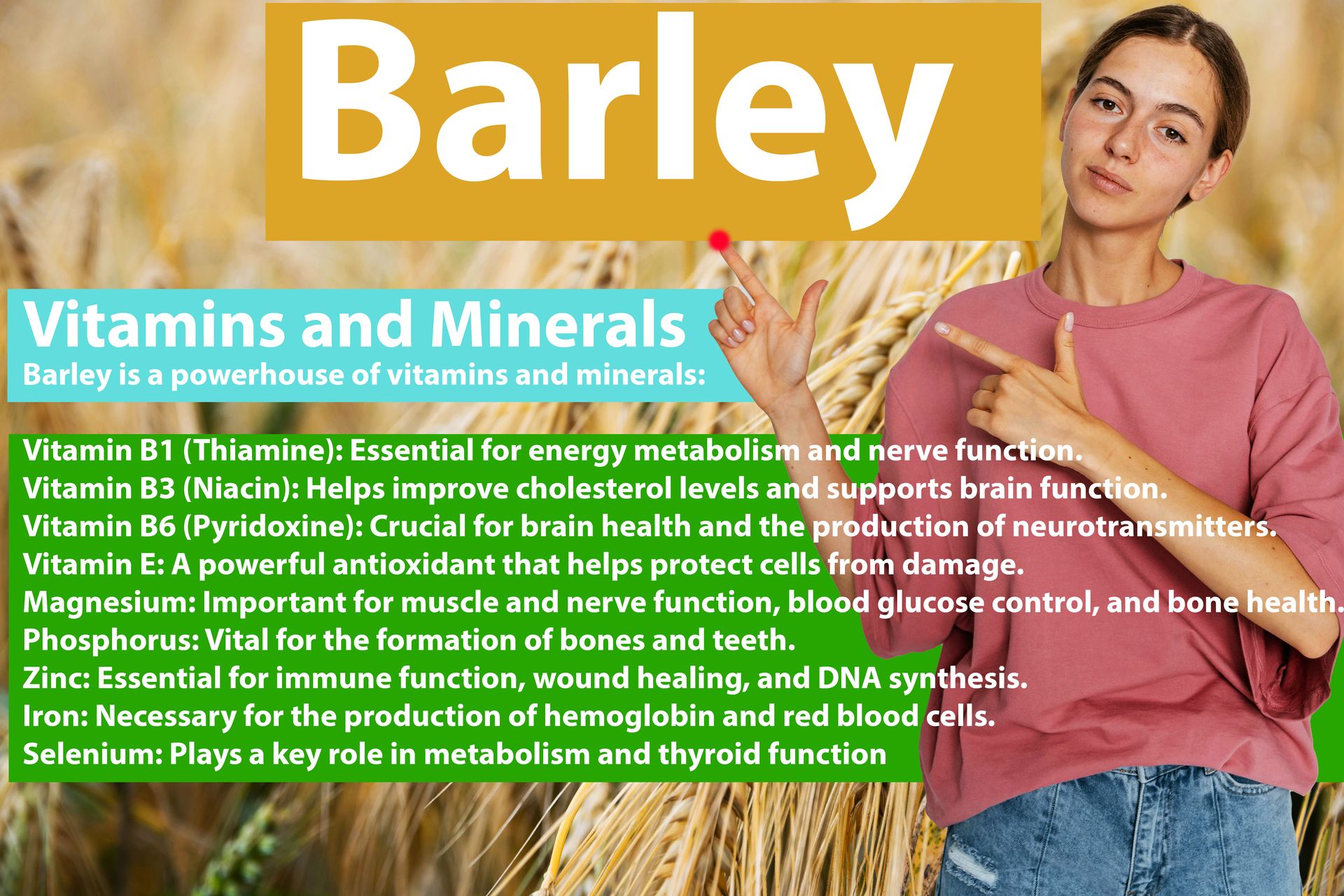Start writing here...
1. Carrots 11. Apple 20. Broccoli
2. Barley 12. Banana
3. Cranberries 13. Grapes
4. Raisins 14. Strawberries
5. Brown Rice 15. Oranges
6. Dried Apricots 16. Peaches
7. Sesame Seeds 17. Pineapple
8. Tips To Fit Exercise Into A Busy Schedule
9. Sunflower Seeds 18. Mango
10. Tofu 19. Watermelon
soon all fruits to come
🌟 Carrots: A Nutrient-Packed Powerhouse for Immunity 🌟
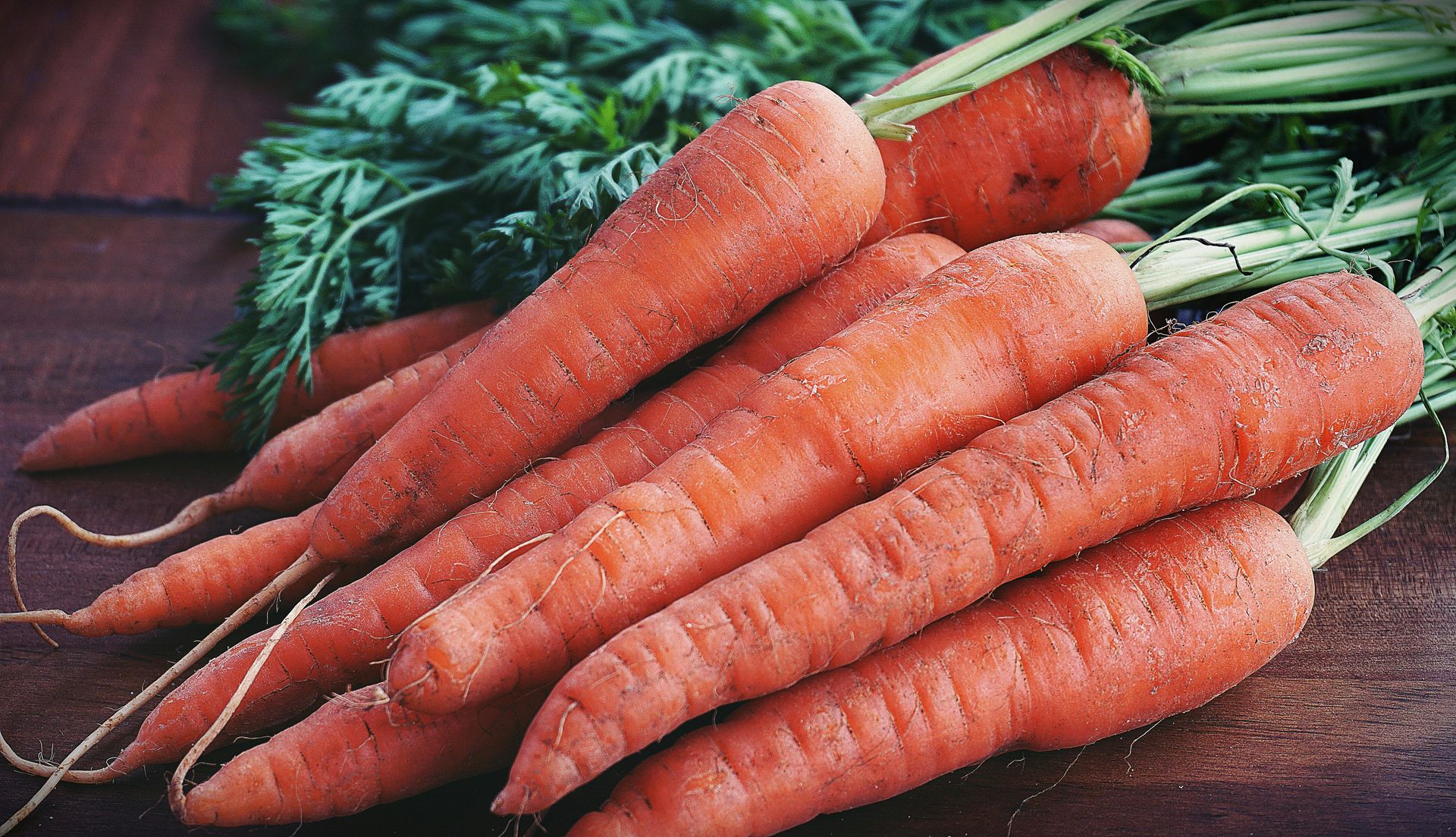
🥕 Introduction
Carrots are an incredible vegetable, packed with beta-carotene and antioxidants, making them an excellent choice for boosting your immune system. Let’s dive into the scientific benefits and nutritional details of carrots, and explore why they are a must-have in your diet.
🥕 Scientific Benefits and Nutritional Information
Carrots are rich in beta-carotene, which the body converts into vitamin A – a crucial nutrient for maintaining a healthy immune system. They also contain antioxidants that help fight off free radicals, reducing oxidative stress and enhancing overall health.
Vitamins and Minerals:
- Vitamin A: Supports vision, immune function, and cell growth.
- Vitamin K: Essential for blood clotting and bone health.
- Vitamin C: Boosts immune function and skin health.
- Potassium: Regulates fluid balance, nerve signals, and muscle contractions.
- Fiber: Aids in digestion and promotes gut health.
🥕 Focus on Immunity Boost
Carrots are especially beneficial for immunity due to their high vitamin A and antioxidant content. Vitamin A strengthens the immune system by supporting the production and function of white blood cells, which help capture and clear bacteria and other pathogens from your bloodstream.
🥕 Diabetes-Friendly Tips
Carrots are a great choice for individuals with diabetes as they have a low glycemic index (GI) and do not cause rapid spikes in blood sugar levels. However, it’s essential to balance them with other low-GI foods.
Fruits to Avoid with High Blood Sugar:
- Mangoes
- Grapes
- Cherries
🥕 Best Time to Eat Carrots
For optimal benefits, carrots can be consumed at any time of the day. However, eating them in the morning can kickstart your day with a nutrient boost, while having them in the evening can help with digestion due to their high fiber content.
🥕 Delicious Carrot Recipes
- Carrot Ginger Soup:
- Ingredients: Carrots, ginger, garlic, vegetable broth, coconut milk.
- Instructions: Sauté ginger and garlic, add chopped carrots and broth, simmer until tender, blend until smooth, stir in coconut milk, and serve hot.
- Carrot and Chickpea Salad:
- Ingredients: Carrots, chickpeas, parsley, lemon juice, olive oil.
- Instructions: Grate carrots, mix with chickpeas, drizzle with lemon juice and olive oil, garnish with chopped parsley.
- Carrot Smoothie:
- Ingredients: Carrots, orange juice, banana, ginger, honey.
- Instructions: Blend all ingredients until smooth, serve chilled.
- Carrot Muffins:
- Ingredients: Grated carrots, whole wheat flour, baking powder, cinnamon, eggs, honey.
- Instructions: Mix dry ingredients, add wet ingredients, fold in grated carrots, bake at 350°F for 20 minutes.
🥕 Health Benefits of Carrots
- Improves Vision: High in vitamin A, promoting good eyesight.
- Boosts Immunity: Antioxidants and vitamins strengthen the immune system.
- Aids Digestion: High fiber content promotes gut health.
- Enhances Skin Health: Antioxidants and vitamin C improve skin texture and tone.
- Supports Heart Health: Potassium helps maintain healthy blood pressure.
- Reduces Cancer Risk: Antioxidants help prevent cell damage.
- Promotes Weight Loss: Low in calories and high in fiber, keeping you full longer.
- Improves Oral Health: Crunchy texture stimulates gums and increases saliva production.
🥕 Carrots for Digestion, Skincare, and Hair Grooming
- Digestion:
- How: Fiber in carrots promotes regular bowel movements and prevents constipation.
- Skincare:
- How: Vitamin C and antioxidants combat free radicals, reducing signs of aging and promoting glowing skin.
- Hair Grooming:
- How: Vitamin A helps in the production of sebum, which keeps the scalp moisturized and promotes healthy hair.
✨ For more information, connect with us and embrace a healthier lifestyle! Get free ebooks, meal plan ideas, diet charts, workout routines, and much more. ✨
Boost Your Immunity with Barley: The Superfood You Need!
Barley, an ancient grain, is not only versatile and delicious but also packed with numerous health benefits. Let’s dive into why barley should be a staple in your diet, especially if you're looking to boost your immunity.
Scientific Information
Barley (Hordeum vulgare) is a cereal grain from the grass family. It is one of the earliest cultivated grains, dating back to the Stone Age. It’s rich in essential nutrients, antioxidants, and dietary fiber, making it an excellent choice for overall health and wellness.
Immunity Boost
Barley contains beta-glucan, a type of soluble fiber known for its immune-boosting properties. Beta-glucans enhance the activity of macrophages, white blood cells that fight off infections, and help stimulate other immune cells to attack and destroy pathogens.
Vitamins and Minerals
Barley is a powerhouse of vitamins and minerals:
- Vitamin B1 (Thiamine): Essential for energy metabolism and nerve function.
- Vitamin B3 (Niacin): Helps improve cholesterol levels and supports brain function.
- Vitamin B6 (Pyridoxine): Crucial for brain health and the production of neurotransmitters.
- Vitamin E: A powerful antioxidant that helps protect cells from damage.
- Magnesium: Important for muscle and nerve function, blood glucose control, and bone health.
- Phosphorus: Vital for the formation of bones and teeth.
- Zinc: Essential for immune function, wound healing, and DNA synthesis.
- Iron: Necessary for the production of hemoglobin and red blood cells.
- Selenium: Plays a key role in metabolism and thyroid function.
Barley and Diabetes
Barley has a low glycemic index, which means it raises blood sugar levels slowly, making it an excellent choice for people with diabetes. It helps in better blood sugar control and reduces the risk of type 2 diabetes. Fruits to avoid with high blood sugar include high-sugar fruits like mangoes, grapes, and bananas.
Best Time to Eat Barley
For optimal results, consume barley in the morning to fuel your day with energy and fiber, or in the evening to promote digestion and help you feel full, reducing late-night snacking.
Delicious Barley Recipes
- Barley and Vegetable Soup
- Ingredients: Barley, carrots, celery, onions, tomatoes, garlic, vegetable broth, salt, pepper.
- Directions: Sauté vegetables, add barley and broth, simmer until barley is tender.
- Barley Salad with Lemon and Herbs
- Ingredients: Cooked barley, cucumber, tomatoes, red onion, parsley, mint, lemon juice, olive oil, salt, pepper.
- Directions: Mix all ingredients in a bowl, toss with lemon juice and olive oil dressing.
- Barley Pilaf with Mushrooms
- Ingredients: Barley, mushrooms, onions, garlic, vegetable broth, olive oil, salt, pepper.
- Directions: Sauté onions and mushrooms, add barley and broth, simmer until barley is tender.
- Barley Porridge with Berries
- Ingredients: Barley, milk (or almond milk), honey, mixed berries, nuts, seeds.
- Directions: Cook barley in milk, top with honey, berries, nuts, and seeds.
Health Benefits of Barley
- Boosts Immunity: Rich in beta-glucan, helps fight infections.
- Supports Heart Health: High fiber content reduces cholesterol levels.
- Aids Digestion: High in dietary fiber, promotes regular bowel movements.
- Regulates Blood Sugar: Low glycemic index, helps manage diabetes.
- Promotes Weight Loss: Keeps you full longer, reduces appetite.
- Improves Skin Health: Antioxidants help protect skin from damage.
- Enhances Hair Health: Nutrients like iron and vitamin E promote hair growth.
- Strengthens Bones: High in phosphorus and magnesium, supports bone health.
Digestion, Skincare, and Hair Grooming
- Digestion: The high fiber content in barley promotes healthy digestion by adding bulk to stool and preventing constipation.
- Skincare: Antioxidants in barley, such as vitamin E, help protect the skin from oxidative stress and damage, leading to healthier and more youthful-looking skin.
- Hair Grooming: Nutrients like iron and vitamin E in barley enhance hair growth and strength, making your hair healthier and shinier.
For more information, connect with us
Boost Your Immunity with Cranberries! 🌟
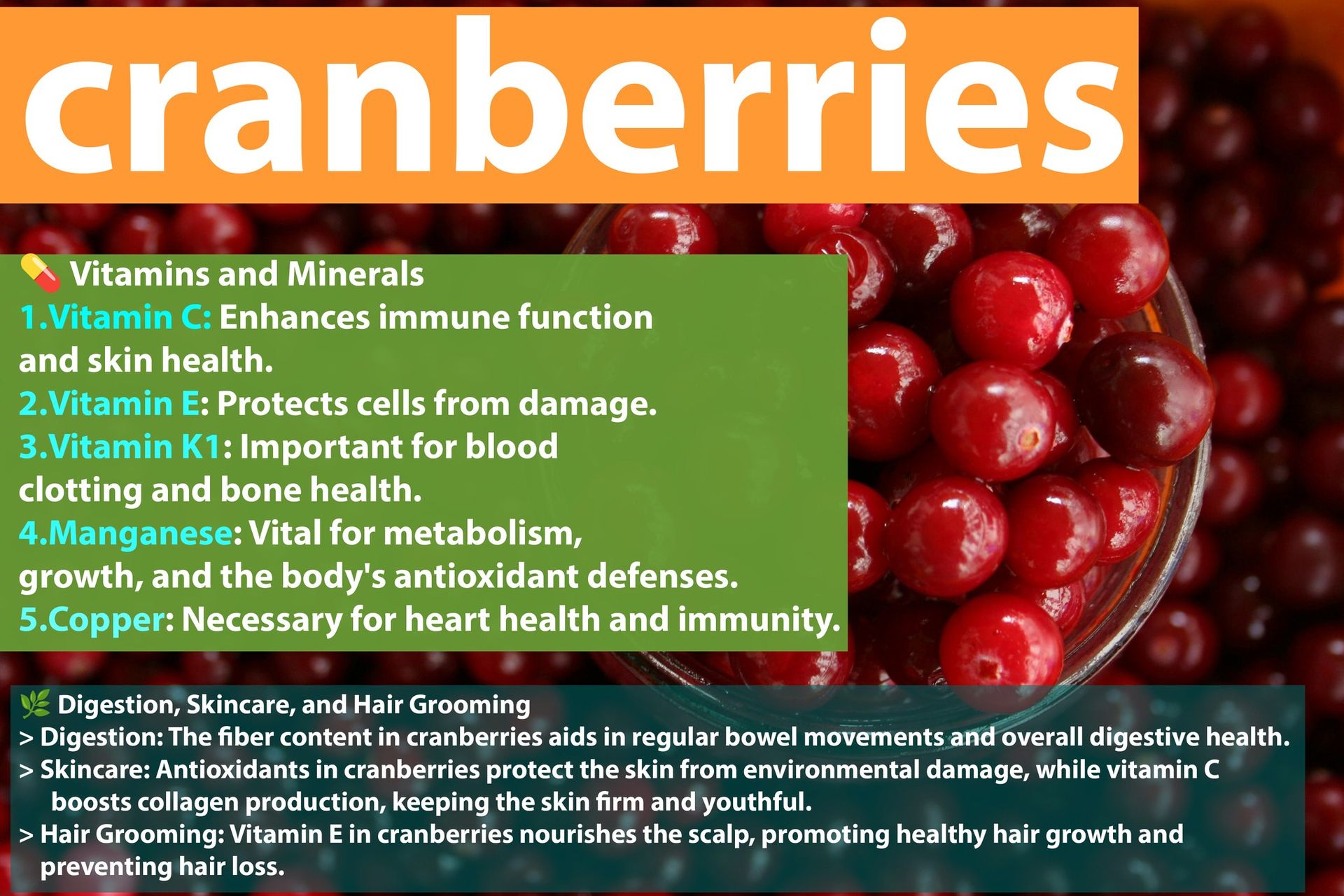
Cranberries are a powerhouse of nutrients and antioxidants, offering a range of health benefits. Let’s dive into why these tart berries should be a staple in your diet, especially if you’re looking to enhance your immunity!
🍒 Scientific Information
Cranberries (Vaccinium macrocarpon) are small, red berries native to North America. They are rich in antioxidants and have been used for centuries for their medicinal properties.
🌟 Immunity Boosting Power
Cranberries are loaded with antioxidants like flavonoids and polyphenols, which help strengthen the immune system by neutralizing harmful free radicals.
💊 Vitamins and Minerals
Vitamin C: Enhances immune function and skin health.
Vitamin E: Protects cells from damage.
Vitamin K1: Important for blood clotting and bone health.
Manganese: Vital for metabolism, growth, and the body's antioxidant defenses.
Copper: Necessary for heart health and immunity.
🍇 Diabetic-Friendly?
Cranberries are a better option for diabetics compared to many other fruits due to their lower glycemic index. However, avoid high-sugar fruits like grapes and bananas if you have high sugar levels.
⏰ Best Time to Eat
Consume cranberries in the morning or evening for optimal benefits. Morning consumption helps kickstart your metabolism, while evening consumption aids in digestion and relaxation.
🥗 Delicious Recipes
1. Cranberry Smoothie: Blend cranberries, Greek yogurt, honey, and a banana.
2. Cranberry Salad: Mix fresh cranberries with spinach, walnuts, feta cheese, and a light vinaigrette.
3. Cranberry Sauce: Cook cranberries with orange juice, zest, and a bit of honey.
4. Cranberry Chicken: Bake chicken breasts with cranberries, rosemary, and a dash of balsamic vinegar.
💪 Health Benefits
Ø Boosts Immunity: High in antioxidants and vitamins.
Ø Aids Digestion: Rich in dietary fiber.
Ø Improves Skin Health: Vitamin C promotes collagen production.
Ø Promotes Hair Growth: Vitamin E improves scalp health.
Ø Reduces Risk of UTIs: Prevents bacteria from sticking to the bladder walls.
Ø Supports Heart Health: Antioxidants lower bad cholesterol levels.
Ø Anti-Inflammatory: Reduces inflammation in the body.
Ø Enhances Oral Health: Prevents gum disease and tooth decay.
🌿 Digestion, Skincare, and Hair Grooming
Digestion: The fiber content in cranberries aids in regular bowel movements and overall digestive health.
Skincare: Antioxidants in cranberries protect the skin from environmental damage, while vitamin C boosts collagen production, keeping the skin firm and youthful.
Hair Grooming: Vitamin E in cranberries nourishes the scalp, promoting healthy hair growth and preventing hair loss.
Click here for more
https://thedelhidude.systeme.io/17384b77 See less
The Power of Raisins
🌟 Boost Your Immunity with Raisins! 🌟
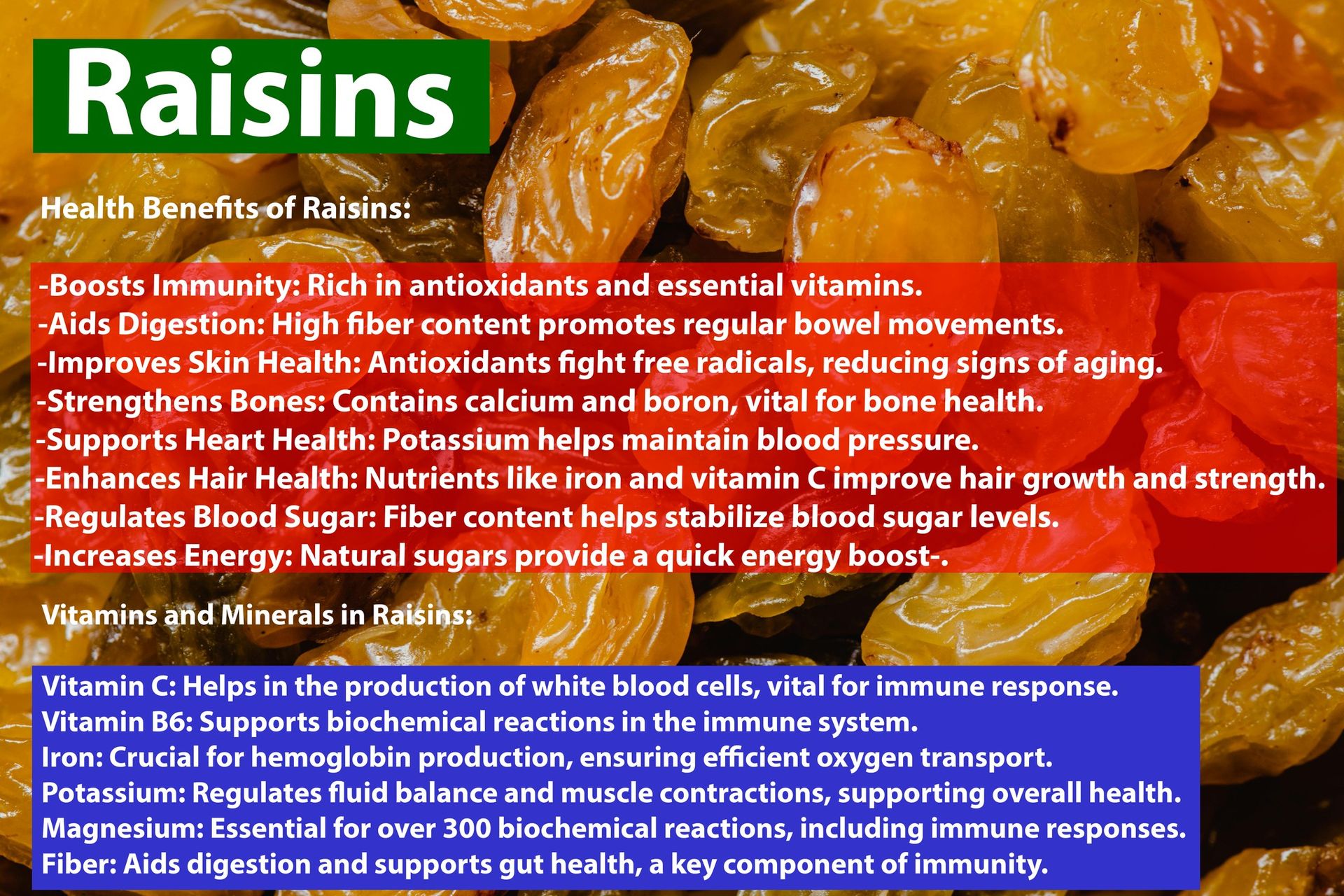
Did you know that raisins, those tiny power-packed dried fruits, can significantly enhance your immune system? Here’s everything you need to know about the health benefits of raisins, especially their role in boosting immunity.
🔬 Scientific Information:
Raisins are dried grapes, primarily made from varieties like Thompson Seedless. They are rich in natural sugars, antioxidants, and several essential nutrients. When it comes to immunity, raisins shine due to their high content of vitamins, minerals, and antioxidants.
💪 Focus on Immunity Boost:
Raisins are packed with antioxidants like polyphenols and flavonoids, which help combat oxidative stress and inflammation. These properties strengthen your immune system, making it more effective at fighting infections.
🧬 Vitamins and Minerals in Raisins:
v Vitamin C: Helps in the production of white blood cells, vital for immune response.
v Vitamin B6: Supports biochemical reactions in the immune system.
v Iron: Crucial for hemoglobin production, ensuring efficient oxygen transport.
v Potassium: Regulates fluid balance and muscle contractions, supporting overall health.
v Magnesium: Essential for over 300 biochemical reactions, including immune responses.
v Fiber: Aids digestion and supports gut health, a key component of immunity.
🍇 Raisins and Diabetes:
For those managing diabetes, moderation is key. Raisins have a medium glycemic index but are rich in fiber, which helps regulate blood sugar levels. It’s best to consult with a healthcare provider to determine the appropriate amount for your diet. Avoid high-sugar fruits like grapes and mangoes if you have high sugar levels.
🕰️ Best Time to Eat Raisins:
Morning: Start your day with a handful of raisins to kickstart your metabolism and provide a steady energy release.
Evening: Consuming raisins in the evening can help curb late-night cravings and aid in digestion.
🍴 Delicious Raisin Recipes:
Raisin and Oatmeal Breakfast Bars:
v Mix oats, honey, raisins, and nuts.
v Bake at 350°F for 20 minutes.
v Perfect for a quick, nutritious breakfast.
Raisin and Spinach Salad:
v Combine fresh spinach, raisins, walnuts, and feta cheese.
v Drizzle with balsamic vinaigrette.
v A delicious and healthy lunch option.
Raisin and Quinoa Pilaf:
v Cook quinoa with vegetable broth.
v Stir in sautéed onions, raisins, and almonds.
v Serve as a nutritious side dish.
Raisin and Yogurt Parfait:
v Layer Greek yogurt, raisins, honey, and granola.
v Enjoy as a healthy dessert or snack.
🩺 Health Benefits of Raisins:
v Boosts Immunity: Rich in antioxidants and essential vitamins.
v Aids Digestion: High fiber content promotes regular bowel movements.
v Improves Skin Health: Antioxidants fight free radicals, reducing signs of aging.
v Strengthens Bones: Contains calcium and boron, vital for bone health.
v Supports Heart Health: Potassium helps maintain blood pressure.
v Enhances Hair Health: Nutrients like iron and vitamin C improve hair growth and strength.
v Regulates Blood Sugar: Fiber content helps stabilize blood sugar levels.
v Increases Energy: Natural sugars provide a quick energy boost.
💇 Skincare and Hair Grooming Benefits:
Skincare: Antioxidants in raisins help fight free radicals, reducing wrinkles and promoting a healthy glow.
Hair Grooming: Raisins are rich in iron, vitamin C, and B vitamins, which improve blood circulation to the scalp, enhancing hair growth and reducing hair fall.
📞 For More Information:
Connect with us for more health tips See less
The Power of Brown Rice for Immunity and Health
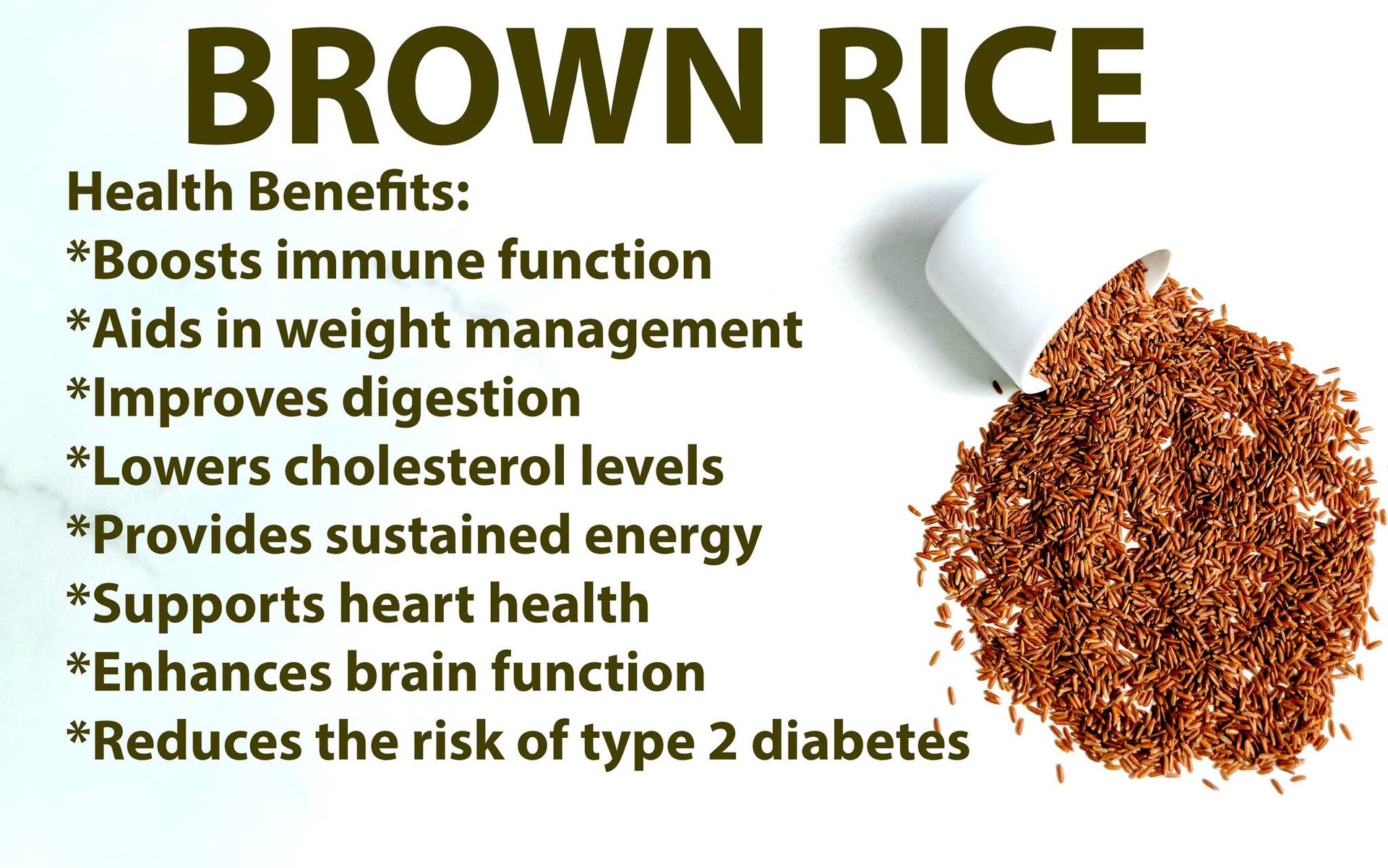
Brown rice is a whole grain that is packed with nutrients and offers numerous health benefits. Here’s why you should include it in your diet:
1. Scientific Information:
Brown rice is less processed than white rice, retaining its bran and germ layers. It is rich in fiber, vitamins, and minerals, making it a healthier choice. Studies show that the nutrients in brown rice can improve digestion, lower cholesterol levels, and provide sustained energy.
2. Immunity Boost:
Brown rice is a good source of vitamins and minerals that play a crucial role in boosting immunity. The presence of antioxidants helps fight off infections and diseases, keeping your immune system strong and healthy.
3. Vitamins and Minerals:
v Magnesium: Supports muscle and nerve function.
v Phosphorus: Essential for healthy bones and teeth.
v B Vitamins (B1, B3, B6): Aid in energy production and brain function.
v Selenium: Boosts immune function and has antioxidant properties.
4. Diabetes-Friendly Choices:
Better Choices: Brown rice has a lower glycemic index than white rice, making it a better option for managing blood sugar levels.
Fruits to Avoid: People with high blood sugar levels should limit their intake of high-sugar fruits like grapes and lychees.
5. Best Times to Eat:
Morning: Brown rice porridge or a brown rice bowl with vegetables can provide sustained energy throughout the day.
Evening: A serving of brown rice with dinner can help with digestion and provide a feeling of fullness.
6. Recipes:
v Brown Rice and Vegetable Stir-Fry: Sauté your favorite vegetables with cooked brown rice, soy sauce, and a touch of sesame oil.
v Brown Rice Salad: Mix cooked brown rice with chopped vegetables, feta cheese, and a lemon vinaigrette.
v Stuffed Bell Peppers: Fill bell peppers with a mixture of brown rice, black beans, corn, and spices.
v Brown Rice Pudding: Cook brown rice with almond milk, cinnamon, and a touch of honey for a healthy dessert.
7. Health Benefits:
v Boosts immune function
v Aids in weight management
v Improves digestion
v Lowers cholesterol levels
v Provides sustained energy
v Supports heart health
v Enhances brain function
v Reduces the risk of type 2 diabetes
v Benefits for Digestion, Skincare, and Hair:
Digestion: The high fiber content in brown rice promotes healthy digestion and regular bowel movements.
Skincare: The antioxidants in brown rice help fight free radicals, reducing signs of aging and promoting healthy skin.
Hair Grooming: The B vitamins in brown rice support hair health, promoting growth and strength.
The Incredible Benefits of Dried Apricots
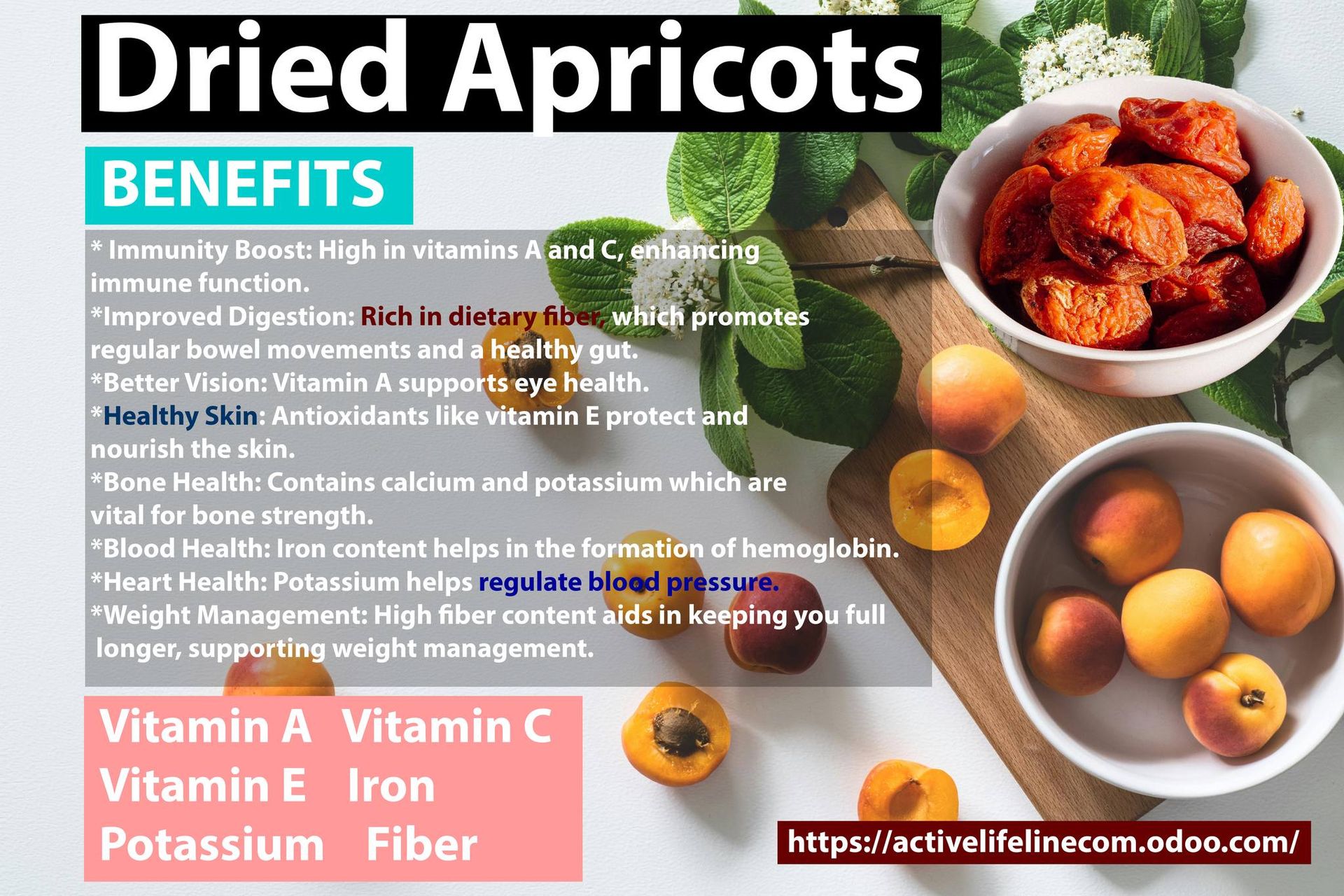
Boost Your Immunity with Dried Apricots
Dried apricots are more than just a delicious snack—they are a powerhouse of nutrients that can significantly boost your immune system. Packed with essential vitamins and minerals, dried apricots can play a crucial role in maintaining your overall health.
Nutritional Profile of Dried Apricots
Dried apricots are rich in:
v Vitamin A: Supports immune function and vision.
v Vitamin C: Enhances immune defense by supporting various cellular functions.
v Vitamin E: Acts as an antioxidant, protecting cells from damage.
v Iron: Essential for blood production and immune function.
v Potassium: Helps maintain fluid balance and muscle function.
v Fiber: Aids in digestion and promotes a healthy gut.
Dried Apricots and Diabetes
For individuals managing diabetes:
Dried Apricots: Low on the glycemic index, making them a safer choice for those with high blood sugar levels.
Avoid: High glycemic index fruits like pineapple and watermelon if you have high sugar levels.
Best Time to Eat Dried Apricots
Morning: Start your day with dried apricots to get an energy boost and help stabilize your blood sugar levels.
Evening: Eating dried apricots in the evening can help curb late-night cravings and promote a healthy digestive system.
Delicious Recipes with Dried Apricots
v Apricot Oatmeal: Mix chopped dried apricots into your morning oatmeal with a sprinkle of nuts.
v Apricot Chicken Salad: Add dried apricots to a chicken salad for a sweet and savory flavor.
v Apricot Smoothie: Blend dried apricots with Greek yogurt, a banana, and a splash of almond milk.
v Apricot Energy Balls: Combine dried apricots, almonds, oats, and honey in a food processor, roll into balls, and refrigerate.
Health Benefits of Dried Apricots
v Immunity Boost: High in vitamins A and C, enhancing immune function.
v Improved Digestion: Rich in dietary fiber, which promotes regular bowel movements and a healthy gut.
v Better Vision: Vitamin A supports eye health.
v Healthy Skin: Antioxidants like vitamin E protect and nourish the skin.
v Bone Health: Contains calcium and potassium which are vital for bone strength.
v Blood Health: Iron content helps in the formation of hemoglobin.
v Heart Health: Potassium helps regulate blood pressure.
v Weight Management: High fiber content aids in keeping you full longer, supporting weight management.
Dried Apricots for Digestion, Skincare, and Hair Growth
Digestion: The high fiber content in dried apricots helps maintain a healthy digestive tract by preventing constipation and promoting regular bowel movements.
Skincare: Vitamins A and E in dried apricots help improve skin elasticity, reduce wrinkles, and protect against sun damage.
Hair Growth: The nutrients in dried apricots, including vitamins A and E, strengthen hair follicles, reduce hair fall, and promote healthy hair growth.
📚 For More Information: Connect with us
🌱 Boost Your Immunity with Sesame Seeds! 🌱
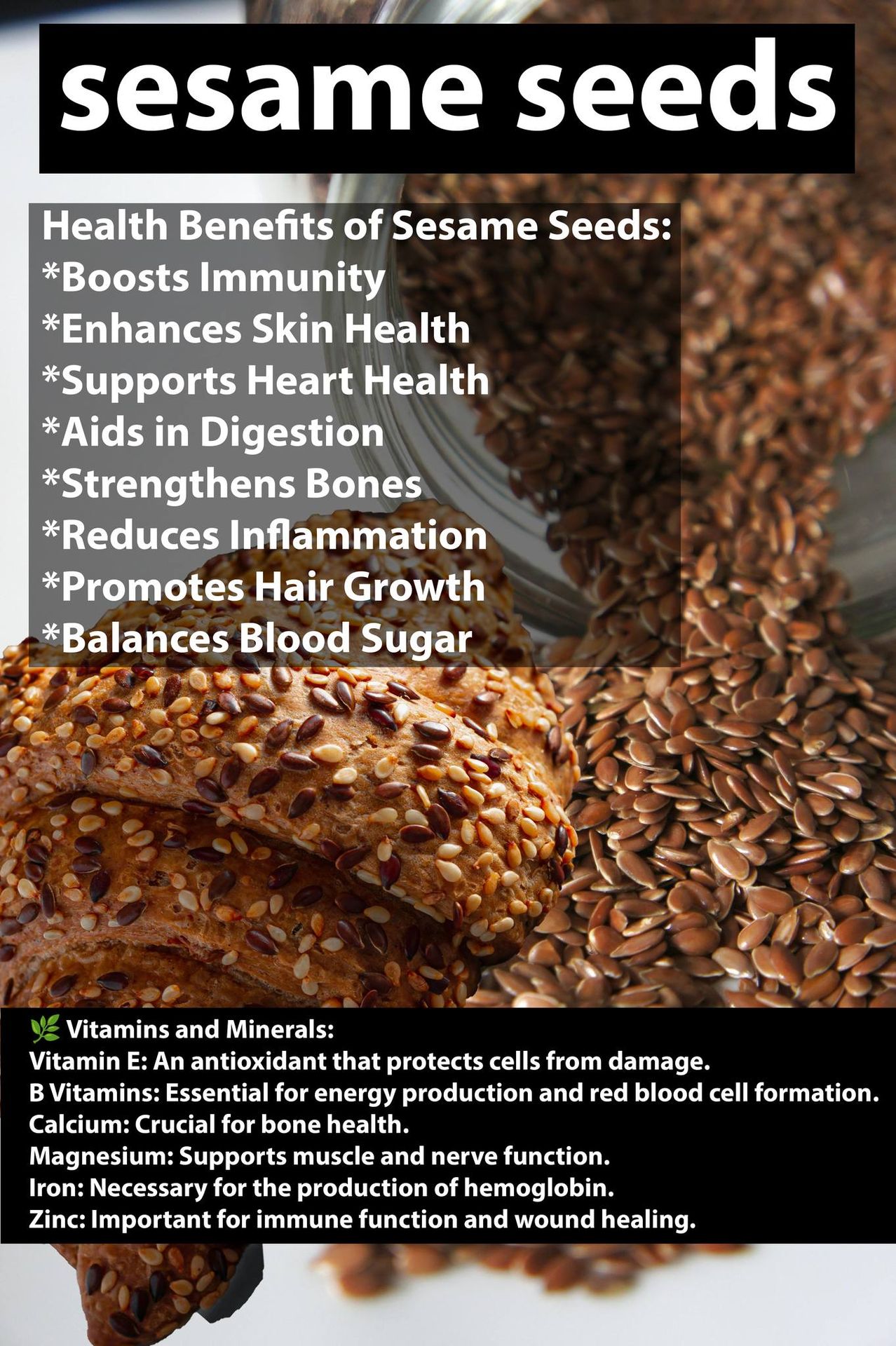
Sesame seeds are tiny powerhouses packed with nutrients that can significantly enhance your health, especially your immune system. Incorporate them into your diet for a natural immunity boost and enjoy a variety of other health benefits. Here’s everything you need to know about sesame seeds.
🌿 Full Valid and Scientific Information:
Sesame seeds are rich in healthy fats, protein, B vitamins, minerals, fiber, and antioxidants. These seeds are not only a great source of energy but also provide essential nutrients for maintaining overall health.
🌿 Vitamins and Minerals:
v Vitamin E: An antioxidant that protects cells from damage.
v B Vitamins: Essential for energy production and red blood cell formation.
v Calcium: Crucial for bone health.
v Magnesium: Supports muscle and nerve function.
v Iron: Necessary for the production of hemoglobin.
v Zinc: Important for immune function and wound healing.
🍏 Diabetes-Friendly Choices:
Sesame seeds have a low glycemic index, making them a good choice for people with diabetes.
Better Fruit Choices for Diabetics: Berries, such as strawberries and blueberries, are low in sugar and high in fiber.
Fruits to Avoid: High-sugar fruits like bananas, grapes, and mangoes should be consumed in moderation.
🕒 Best Time to Eat Sesame Seeds:
For optimal results, sesame seeds can be consumed:
Morning: Start your day with sesame seeds for an energy boost and to keep your metabolism active.
Evening: They can also be enjoyed in the evening as a healthy snack.
🍽️ 4 Delicious Recipes with Sesame Seeds:
Sesame Seed Smoothie:
Blend together banana, almond milk, honey, and a tablespoon of sesame seeds for a nutritious breakfast smoothie.
Sesame-Crusted Chicken: Coat chicken breasts with sesame seeds and bake until golden brown. Serve with steamed vegetables.
Sesame Stir-Fry: Stir-fry mixed vegetables and tofu with a sesame oil and soy sauce dressing. Sprinkle sesame seeds on top before serving.
Sesame Energy Bars:Mix sesame seeds, oats, honey, and dried fruits. Press into a baking dish and refrigerate until set. Cut into bars for a healthy snack.
🌟 8 Health Benefits of Sesame Seeds:
v Boosts Immunity
v Enhances Skin Health
v Supports Heart Health
v Aids in Digestion
v Strengthens Bones
v Reduces Inflammation
v Promotes Hair Growth
v Balances Blood Sugar
✨ Health Benefits for Digestion, Skincare, and Hair Grooming:
Digestion:
High Fiber Content: Promotes regular bowel movements and prevents constipation.
Healthy Fats: Supports the absorption of fat-soluble vitamins.
Skincare:
Antioxidant Protection: Vitamin E protects the skin from oxidative damage.
Natural Oils: Keep the skin moisturized and reduce dryness.
Hair Grooming:
Nourishes Hair Follicles: Nutrients like zinc and B vitamins strengthen hair follicles.
Promotes Shine and Growth: Healthy fats and protein contribute to shiny, strong hair.
For more information and personalized guidance, connect with us See less
Top Tips for Fitting Exercise into Your Busy Schedule for Effective Weight Loss! 🚀

Struggling to find time for exercise in your hectic daily routine? Don’t worry! With a few strategic adjustments, you can incorporate effective workouts into your schedule, no matter how busy you are. Here are some scientifically-backed tips to help you stay active and achieve your weight loss goals.
🌟 Tips to Fit Exercise into a Busy Schedule 🌟
1. Prioritize and Schedule:
v Make it a Non-Negotiable: Treat your workouts like important meetings. Schedule them in your calendar and stick to them.
v Morning Workouts: Exercising in the morning boosts metabolism and helps you stay energized throughout the day.
2. Break it Up:
v Short, Intense Sessions: High-Intensity Interval Training (HIIT) is highly effective for weight loss and can be done in 20-30 minutes.
v Multiple Short Workouts: Break your exercise into 10-15 minute sessions spread throughout the day.
3. Incorporate Movement into Daily Activities:
v Active Commute: Walk or bike to work if possible.
v Take the Stairs: Skip the elevator and use the stairs.
v Desk Exercises: Perform simple exercises like leg lifts or seated marches while working.
4. Utilize Technology:
v Fitness Apps: Use workout apps for guided sessions that fit your schedule.
v Online Workouts: Follow short workout videos online that can be done at home.
5. Make it Fun:
v Choose Enjoyable Activities: Whether it’s dancing, swimming, or hiking, pick activities you love to stay motivated.
v Workout with Friends: Socializing can make exercise more enjoyable and help you stay committed.
6. Set Realistic Goals:
v Start Small: Begin with achievable goals and gradually increase intensity and duration.
v Track Progress: Use a journal or app to track your workouts and monitor progress.
7. Incorporate Strength Training:
v Build Muscle: Muscle burns more calories than fat, even at rest. Include strength training exercises at least twice a week.
v Use Bodyweight: Push-ups, squats, and planks can be done anywhere, anytime.
8. Stay Consistent:
o Consistency Over Perfection: Aim to be consistent with your workouts, even if they are short. Regular exercise is more effective than sporadic intense workouts.
🔥 Benefits of Regular Exercise for Weight Loss
v Increases Metabolism: Regular physical activity boosts your metabolic rate, aiding in weight loss.
v Burns Calories: Exercise helps burn calories, creating a calorie deficit necessary for weight loss.
v Preserves Lean Muscle: Strength training preserves muscle mass while losing fat.
v Enhances Mood: Physical activity releases endorphins, reducing stress and emotional eating.
v Improves Sleep: Regular exercise promotes better sleep, which is crucial for weight management.
🏋️♀️ 1-Week Beginner Workout Plan 🏋️♂️
Day 1: Full-Body Workout
• Warm-up: 5-10 minutes brisk walk or light jog
• Push-ups: 3 sets of 10 reps
• Squats: 3 sets of 15 reps
• Planks: 3 sets of 20 seconds
• Lunges: 3 sets of 12 reps per leg
• Cool-down: 5-10 minutes stretching
Day 2: Cardio
• Warm-up: 5-10 minutes brisk walk or light jog
• Cardio: 30 minutes of jogging, cycling, or brisk walking
• Cool-down: 5-10 minutes stretching
Day 3: Upper Body
• Warm-up: 5-10 minutes brisk walk or light jog
• Dumbbell Press: 3 sets of 12 reps
• Dumbbell Rows: 3 sets of 12 reps per arm
• Bicep Curls: 3 sets of 15 reps
• Tricep Dips: 3 sets of 10 reps
• Cool-down: 5-10 minutes stretching
Day 4: Rest Day
• Light stretching or yoga
Day 5: Lower Body
• Warm-up: 5-10 minutes brisk walk or light jog
• Deadlifts: 3 sets of 12 reps
• Step-ups: 3 sets of 10 reps per leg
• Calf Raises: 3 sets of 15 reps
• Glute Bridges: 3 sets of 15 reps
• Cool-down: 5-10 minutes stretching
Day 6: Cardio + Core
• Warm-up: 5-10 minutes brisk walk or light jog
• Cardio: 20 minutes of running, cycling, or brisk walking
• Core: Planks (3 sets of 30 seconds), Russian Twists (3 sets of 15 reps per side), Leg Raises (3 sets of 15 reps)
• Cool-down: 5-10 minutes stretching
Day 7: Rest Day
• Light stretching or yoga
🍏 1-Week Beginner Diet Chart 🍏
Day 1:
• Breakfast: Oatmeal with fresh fruits and a sprinkle of nuts
• Lunch: Grilled chicken salad with mixed greens, cherry tomatoes, and vinaigrette
• Snack: Greek yogurt with honey
• Dinner: Baked salmon with steamed broccoli and quinoa
Day 2:
• Breakfast: Smoothie with spinach, banana, berries, and almond milk
• Lunch: Turkey and avocado wrap with whole wheat tortilla
• Snack: Apple slices with peanut butter
• Dinner: Stir-fried tofu with mixed vegetables and brown rice
Day 3:
• Breakfast: Scrambled eggs with spinach and whole grain toast
• Lunch: Quinoa salad with chickpeas, cucumber, bell peppers, and feta cheese
• Snack: Carrot sticks with hummus
• Dinner: Grilled shrimp with asparagus and sweet potato
Day 4:
• Breakfast: Chia pudding with almond milk and fresh berries
• Lunch: Lentil soup with a side of mixed green salad
• Snack: Handful of mixed nuts
• Dinner: Chicken stir-fry with bell peppers, broccoli, and brown rice
Day 5:
• Breakfast: Greek yogurt with granola and fresh fruit
• Lunch: Whole grain pasta with marinara sauce and a side salad
• Snack: Celery sticks with almond butter
• Dinner: Baked cod with green beans and mashed cauliflower
Day 6:
• Breakfast: Smoothie bowl with mixed berries, banana, and granola
• Lunch: Veggie wrap with hummus, spinach, cucumber, and bell peppers
• Snack: Cottage cheese with pineapple chunks
• Dinner: Beef and vegetable stir-fry with quinoa
Day 7:
• Breakfast: Whole grain pancakes with a side of fresh fruit
• Lunch: Chicken Caesar salad with a light dressing
• Snack: Sliced pear with cheese
• Dinner: Stuffed bell peppers with ground turkey and brown rice
Boost Your Immunity with Sunflower Seeds
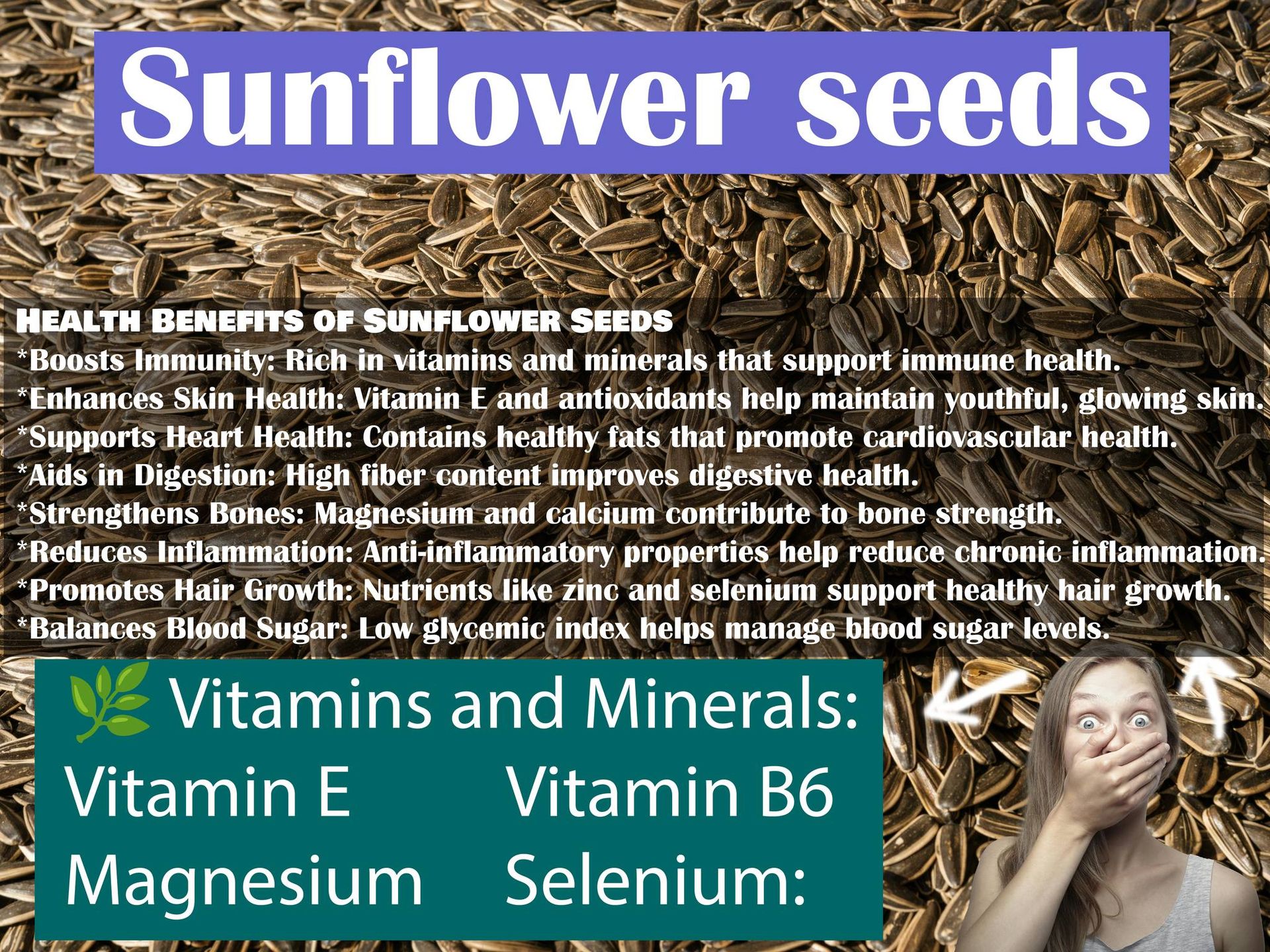
Are you looking to boost your immunity and improve your overall health? Sunflower seeds might just be the superfood you need! Packed with essential vitamins, minerals, and health benefits, these tiny seeds can make a big difference in your diet. Let’s dive into the amazing benefits of sunflower seeds and how they can support your well-being.
Boost Your Immunity with Sunflower
Seeds
Sunflower seeds are a powerhouse of nutrients that can significantly enhance your immune system. Here’s why they should be a part of your daily diet:
Vitamins and Minerals:
-Vitamin E: A potent antioxidant that helps combat oxidative stress and supports immune function.
-Vitamin B6: Essential for proper brain development and function, and helps boost your immune response.
-Magnesium: Crucial for muscle and nerve function, maintaining a healthy immune system.
-Selenium: An important mineral that helps reduce inflammation and enhance immunity.
Diabetes-Friendly Choices:
Sunflower seeds are a great snack option for people with diabetes as they have a low glycemic index and help regulate blood sugar levels. However, be mindful of portion sizes to avoid excess calorie intake.
Better Fruit Choices for Diabetics: Berries (such as strawberries and blueberries) are low in sugar and high in fiber, making them excellent for maintaining blood sugar levels.
Fruits to Avoid with High Sugar Levels: High-sugar fruits like bananas, grapes, and mangoes should be consumed in moderation.
Best Time to Eat Sunflower Seeds
For optimal results, sunflower seeds can be eaten:
Morning: Incorporate them into your breakfast to kickstart your day with a nutrient boost.
Evening: Enjoy them as a healthy snack to curb your evening cravings.
5
Delicious Sunflower Seed Recipes
1.: Blend sunflower seeds with spinach, banana, and almond milk for a nutritious start to your day.
Sunflower Seed Salad: Toss sunflower seeds with mixed greens, cherry tomatoes, cucumbers, and a light vinaigrette.
2.Sunflower Seed Granola: Mix sunflower seeds with oats, honey, and dried fruits for a homemade granola.
3.Sunflower Seed Butter: Blend sunflower seeds into a creamy spread, perfect for toast or as a dip for veggies.
4.Sunflower Seed Energy Bars: Combine sunflower seeds with dates, nuts, and a touch of honey for a quick energy boost.
8 Health Benefits of Sunflower Seeds
1.Boosts Immunity: Rich in vitamins and minerals that support immune health.
2.Enhances Skin Health: Vitamin E and antioxidants help maintain youthful, glowing skin.
3.Supports Heart Health: Contains healthy fats that promote cardiovascular health.
4.Aids in Digestion: High fiber content improves digestive health.
5.Strengthens Bones: Magnesium and calcium contribute to bone strength.
6.Reduces Inflammation: Anti-inflammatory properties help reduce chronic inflammation.
7.Promotes Hair Growth: Nutrients like zinc and selenium support healthy hair growth.
8.Balances Blood Sugar: Low glycemic index helps manage blood sugar levels.
Health Benefits for Digestion,
Skincare, and Hair Grooming
Digestion:
-High Fiber Content: Sunflower seeds are rich in dietary fiber, which promotes regular bowel movements and prevents constipation.
-Probiotics Support: Helps maintain a healthy gut microbiome by feeding beneficial bacteria.
Skincare:
-Antioxidant Protection: Vitamin E in sunflower seeds protects the skin from oxidative damage and keeps it moisturized.
-Anti-Inflammatory Properties: Reduces skin redness and inflammation, promoting a clearer complexion.
Hair Grooming:
-Nourishes Hair Follicles: Nutrients like zinc and selenium strengthen hair follicles, reducing hair loss.
-Promotes Shine and Growth: Vitamin E and healthy fats contribute to shiny, healthy hair and encourage growth.
For more information, connect with us
Tofu:
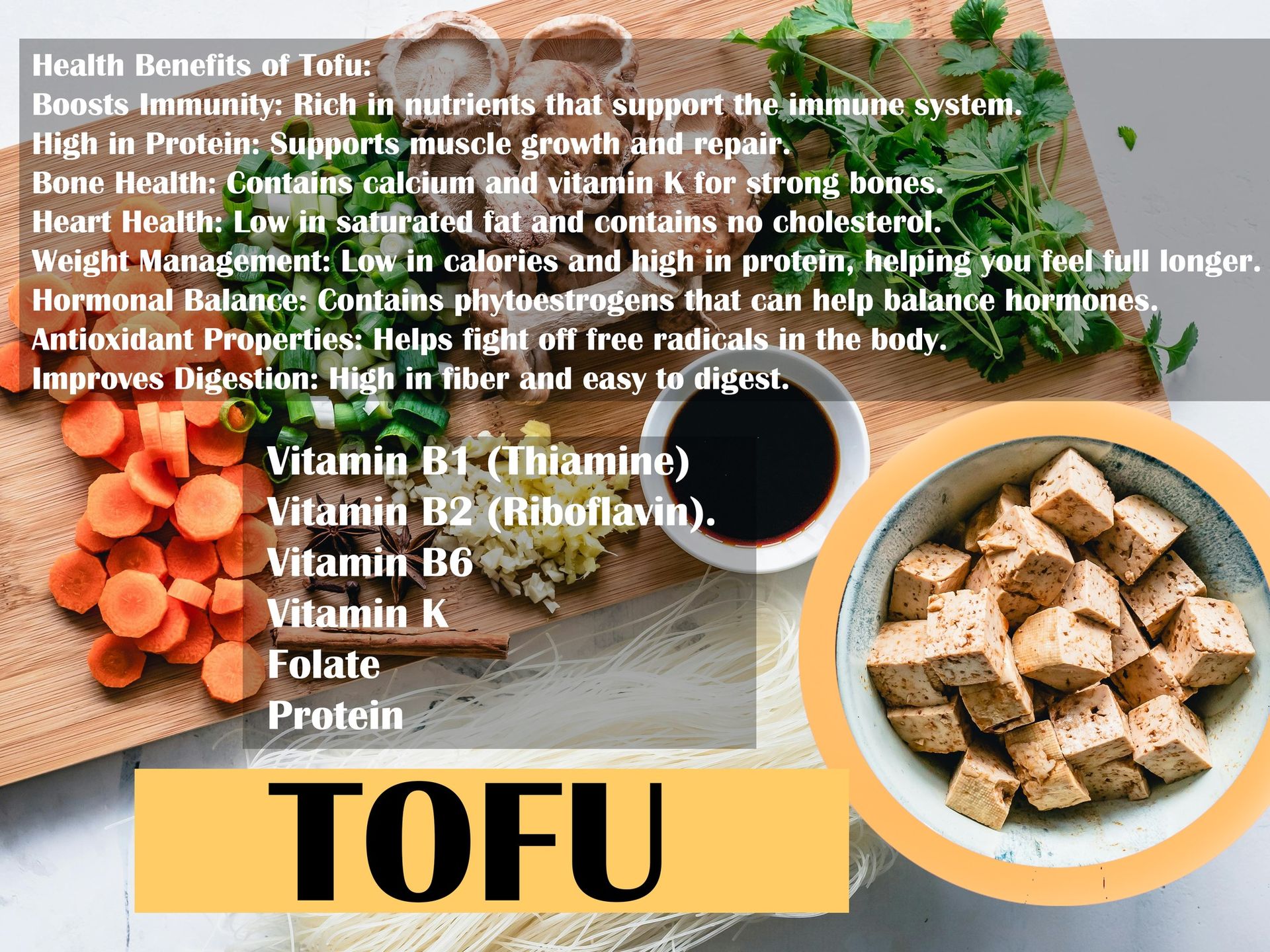
Tofu, a versatile and nutritious food made from soybeans, is an excellent addition to your diet, especially for boosting your immunity! Here's everything you need to know about the benefits of tofu:
Scientific Information about Tofu:
Tofu, also known as bean curd, is rich in protein and contains all nine essential amino acids. It is also packed with vitamins and minerals that are crucial for maintaining overall health.
Focus Area: Immunity Boost
Tofu is rich in nutrients that support the immune system, including:
-Protein: Essential for building and repairing tissues.
-Iron: Supports the production of hemoglobin and immune function.
-Calcium: Important for bone health and proper function of the immune system.
-Magnesium: Helps in over 300 biochemical reactions in the body, including those that support immune health.
-Vitamins and Minerals in Tofu:
-Vitamin B1 (Thiamine): Supports energy production and immune function.
-Vitamin B2 (Riboflavin): Helps in the production of energy and maintenance of the nervous system.
-Vitamin B6: Important for brain health and immune function.
-Vitamin K: Vital for bone health and blood clotting.
-Folate: Essential for DNA synthesis and repair, and immune health.
Diabetes Management:
Tofu is a low-glycemic food, making it suitable for those with diabetes as it does not cause rapid spikes in blood sugar levels.
Fruits to Avoid with High Blood Sugar:
High-Sugar Fruits: Avoid fruits like mangoes, grapes, and bananas if you have high blood sugar levels. Opt for berries, apples, and pears which have lower sugar content.
Best Time to Eat Tofu:
Morning: Tofu can be consumed in the morning as part of a high-protein breakfast to kickstart your day.
Evening: It is also great for dinner due to its light and easily digestible nature.
Tofu Recipes:
Tofu Scramble: A healthy alternative to scrambled eggs. Sauté crumbled tofu with turmeric, spinach, bell peppers, and onions.
Grilled Tofu Salad: Marinate tofu in soy sauce and lemon juice, then grill and toss with mixed greens, cherry tomatoes, cucumbers, and a light vinaigrette.
Tofu Stir-Fry: Stir-fry tofu with broccoli, carrots, snap peas, and a ginger-soy sauce.
Tofu Smoothie: Blend silken tofu with almond milk, berries, a banana, and a touch of honey for a protein-packed smoothie.
Baked Tofu Nuggets: Coat tofu cubes in a mixture of breadcrumbs and spices, then bake until crispy.
Health Benefits of Tofu:
-Boosts Immunity: Rich in nutrients that support the immune system.
-High in Protein: Supports muscle growth and repair.
-Bone Health: Contains calcium and vitamin K for strong bones.
-Heart Health: Low in saturated fat and contains no cholesterol.
-Weight Management: Low in calories and high in protein, helping you feel full longer.
-Hormonal Balance: Contains phytoestrogens that can help balance hormones.
-Antioxidant Properties: Helps fight off free radicals in the body.
-Improves Digestion: High in fiber and easy to digest.
Digestion, Skincare, and Hair Grooming:
Digestion: Tofu is rich in fiber, aiding in digestive health and regular bowel movements.
Skincare: The antioxidants in tofu help protect the skin from damage and promote a healthy glow.
Hair Grooming: The protein in tofu strengthens hair follicles and promotes healthy hair growth.
Connect with Us!
For more information, connect with us and embark on a journey towards a
healthier life. Get free eBooks, meal plan ideas, diet charts, workout
routines, and much more!

🍎 Apple: A Nutrient-Packed Powerhouse for Immunity 🍎
1. Scientific Information
Apples (Malus domestica) are one of the most widely consumed fruits globally, known for their rich nutrient content and numerous health benefits. They are high in dietary fiber, antioxidants, and essential vitamins, making them an integral part of a healthy diet. The saying "An apple a day keeps the doctor away" is backed by the fruit's ability to contribute to overall wellness.
2. Focus on Immunity Boost
Apples are an excellent source of antioxidants, particularly vitamin C, which plays a critical role in boosting the immune system. The antioxidants in apples help neutralize free radicals in the body, reducing inflammation and supporting immune function. Quercetin, a flavonoid found in apples, also enhances the immune response by modulating the activity of immune cells.
3. Vitamins and Minerals Detail
- Vitamin C: Boosts immune function, aids in collagen production, and acts as a powerful antioxidant.
- Vitamin A: Supports vision, immune function, and skin health.
- Potassium: Helps maintain electrolyte balance, supports heart health, and regulates blood pressure.
- Dietary Fiber: Promotes healthy digestion and maintains blood sugar levels.
- B-complex Vitamins (B6, Riboflavin, Thiamin): Assist in energy production and maintaining red blood cells.
4. Apples and Diabetes
Apples have a low glycemic index, making them a better fruit option for people with diabetes. They help in maintaining stable blood sugar levels and provide a slow release of energy. However, diabetics should avoid high-sugar fruits like mangoes, grapes, and bananas, which can cause spikes in blood sugar levels.
5. Best Time to Eat Apples
For maximum benefits, apples can be consumed at any time of the day. Eating them in the morning helps kickstart your day with a fiber and nutrient boost, while consuming them in the evening can aid digestion and curb late-night cravings.
6. Delicious Apple Recipes
- Apple Cinnamon Oatmeal
- Ingredients: Oats, apple slices, cinnamon, honey, milk or almond milk.
- Instructions: Cook oats in milk, add apple slices, sprinkle cinnamon, drizzle honey, and enjoy a warm, hearty breakfast.
- Apple and Spinach Salad
- Ingredients: Apple slices, spinach, walnuts, feta cheese, balsamic vinaigrette.
- Instructions: Toss all ingredients together for a fresh and nutrient-packed salad.
- Baked Apples with Cinnamon
- Ingredients: Apples, cinnamon, nuts, raisins, honey.
- Instructions: Core the apples, fill with nuts and raisins, sprinkle with cinnamon, drizzle with honey, and bake until tender.
- Apple Smoothie
- Ingredients: Apple slices, banana, yogurt, honey, cinnamon.
- Instructions: Blend all ingredients until smooth and enjoy a refreshing drink.
7. Health Benefits of Apples
- Boosts Immunity: Rich in antioxidants like vitamin C and quercetin, apples enhance immune function.
- Supports Heart Health: High in fiber and potassium, apples help lower blood pressure and cholesterol levels.
- Aids Digestion: Dietary fiber in apples promotes regular bowel movements and prevents constipation.
- Helps in Weight Management: Low in calories and high in fiber, apples keep you full longer.
- Improves Skin Health: Antioxidants and vitamins in apples help protect skin from damage and promote a healthy glow.
- Enhances Brain Health: Quercetin in apples protects brain cells from oxidative stress.
- Regulates Blood Sugar: Apples have a low glycemic index, helping to manage blood sugar levels.
- Strengthens Bones: Phytonutrients in apples may help increase bone density and strength.
8. Digestion, Skincare, and Hair Grooming Benefits
- Digestion: Apples contain both soluble and insoluble fiber, which aids in healthy digestion by adding bulk to stool and promoting regularity.
- Skincare: The vitamin C and antioxidants in apples help in collagen production, reducing wrinkles and promoting youthful skin.
- Hair Grooming: Apples' high vitamin content, particularly vitamin C and A, contributes to healthy hair by supporting scalp health and promoting hair growth.

🍌 Bananas: A Nutrient-Packed Powerhouse for Health and Immunity 🍌
1. Scientific Information
Bananas, botanically classified as Musa, are one of the most widely consumed fruits in the world. They are an excellent source of essential nutrients, including vitamins, minerals, and antioxidants, making them a staple in many diets. Bananas are known for their high potassium content, which plays a crucial role in maintaining heart health and regulating blood pressure.
2. Focus on Immunity Boost
Bananas are rich in vitamin C and antioxidants, which help strengthen the immune system by neutralizing harmful free radicals. The presence of vitamin B6 in bananas is vital for the production of white blood cells, which are essential for immune responses. Regular consumption of bananas can help enhance your body's ability to fight infections and stay healthy.
3. Vitamins and Minerals in Bananas
- Vitamin C: Boosts immune function and skin health.
- Vitamin B6: Supports brain health, immune function, and red blood cell production.
- Potassium: Helps maintain normal blood pressure and supports heart health.
- Magnesium: Contributes to muscle and nerve function, blood glucose control, and energy production.
- Fiber: Aids digestion and promotes a healthy gut.
4. Bananas and Diabetes
Bananas have a moderate glycemic index (GI) and can be consumed by individuals with diabetes, but in moderation. Their fiber content helps slow down the absorption of sugar, preventing spikes in blood sugar levels. However, it is advisable to pair bananas with a source of protein or healthy fat to further stabilize blood sugar levels. People with high blood sugar should avoid high-sugar fruits like mangoes and grapes.
5. Best Time to Eat Bananas
- Morning: Consuming a banana in the morning can provide a quick energy boost and help keep you full, thanks to its fiber content.
- Evening: Eating a banana in the evening can promote relaxation due to its magnesium content, which can help calm your muscles and nerves.
6. Delicious Banana Recipes
- Banana Oatmeal Pancakes
- Ingredients: Bananas, oats, eggs, cinnamon, baking powder, vanilla extract.
- Directions: Blend all ingredients into a batter, cook on a hot griddle until golden brown.
- Banana Smoothie
- Ingredients: Banana, almond milk, spinach, peanut butter, chia seeds.
- Directions: Blend all ingredients until smooth, serve chilled.
- Banana Bread
- Ingredients: Ripe bananas, whole wheat flour, baking soda, eggs, honey, walnuts.
- Directions: Mix ingredients, bake at 350°F for 50-60 minutes.
- Banana Ice Cream
- Ingredients: Frozen bananas, vanilla extract, cocoa powder.
- Directions: Blend until creamy, enjoy as a healthy dessert.
7. Health Benefits of Bananas
- Boosts Immunity: Rich in vitamin C and B6, helps fight infections.
- Supports Heart Health: High in potassium, regulates blood pressure.
- Aids Digestion: Contains dietary fiber that promotes regular bowel movements.
- Enhances Skin Health: Vitamin C helps in collagen production, improving skin texture.
- Promotes Weight Loss: Low in calories and high in fiber, keeps you full longer.
- Improves Mood: Contains tryptophan, which the body converts into serotonin, a mood stabilizer.
- Strengthens Bones: Magnesium and potassium support bone health.
- Boosts Energy: Natural sugars in bananas provide a quick energy boost.
8. Bananas for Digestion, Skincare, and Hair Grooming
- Digestion: The dietary fiber in bananas helps regulate the digestive system, preventing constipation and promoting healthy gut bacteria.
- Skincare: Vitamin C and antioxidants in bananas protect the skin from oxidative stress, helping to maintain a youthful glow.
- Hair Grooming: Bananas contain natural oils that nourish the scalp, and their high vitamin B6 content helps maintain healthy hair.

🍇 Grapes: A Nutrient Powerhouse for Boosting Immunity 🍇
1. Scientific Information
Grapes (Vitis vinifera) are one of the oldest cultivated fruits, rich in antioxidants, vitamins, and minerals. Known for their sweet and tangy flavor, grapes are not only delicious but also provide numerous health benefits, making them an essential part of a healthy diet.
2. Focus Area: Immunity Boost
Grapes are packed with immune-boosting antioxidants like resveratrol, flavonoids, and vitamin C. These antioxidants help neutralize free radicals, reducing oxidative stress and enhancing immune function. Resveratrol, in particular, has been shown to have anti-inflammatory properties, which further support a healthy immune system.
3. Vitamins and Minerals Detail
- Vitamin C: Boosts immune function, supports skin health, and aids in wound healing.
- Vitamin K: Essential for blood clotting and bone health.
- Vitamin B6: Supports brain health and the production of neurotransmitters.
- Potassium: Helps regulate blood pressure and maintain heart health.
- Copper: Vital for forming red blood cells and maintaining nerve cells and the immune system.
4. Diabetes Considerations
Grapes have a moderate glycemic index (GI), meaning they can be consumed in moderation by people with diabetes. However, it's essential to monitor portion sizes to avoid spikes in blood sugar. Fruits to Avoid with High Blood Sugar:
- Bananas
- Mangoes
- Pineapple
5. Best Time to Eat Grapes
Grapes can be enjoyed at any time of the day. Consuming them in the morning provides an energy boost and helps kickstart digestion. Eating them in the evening can satisfy sweet cravings without consuming high-calorie desserts.
6. Delicious Recipes with Grapes
- Grape and Walnut Salad
- Ingredients: Grapes, mixed greens, walnuts, goat cheese, balsamic vinaigrette.
- Instructions: Toss all ingredients together and drizzle with vinaigrette for a refreshing salad.
- Roasted Grapes with Balsamic Vinegar
- Ingredients: Grapes, balsamic vinegar, olive oil, sea salt.
- Instructions: Toss grapes in olive oil and balsamic vinegar, roast at 400°F for 20 minutes.
- Grape and Chicken Wrap
- Ingredients: Grapes, grilled chicken, whole wheat wrap, lettuce, feta cheese.
- Instructions: Fill the wrap with ingredients, roll, and enjoy a healthy lunch.
- Frozen Grape Pops
- Ingredients: Grapes, lemon juice, honey.
- Instructions: Blend grapes with lemon juice and honey, pour into molds, and freeze.
7. 8 Health Benefits of Grapes
- Boosts Immunity: Rich in antioxidants, grapes enhance the body's ability to fight infections.
- Promotes Heart Health: Flavonoids and potassium help regulate blood pressure and improve heart function.
- Supports Eye Health: The antioxidants in grapes protect the retina from oxidative damage.
- Aids in Weight Management: Low in calories and high in water content, grapes are a great snack for weight loss.
- Reduces Inflammation: Resveratrol in grapes helps reduce inflammation in the body.
- Improves Skin Health: Vitamin C and antioxidants in grapes promote collagen production and protect against skin aging.
- Enhances Brain Function: The nutrients in grapes support cognitive function and reduce the risk of neurodegenerative diseases.
- Supports Digestive Health: Grapes contain fiber, which aids in digestion and prevents constipation.
8. Grapes for Digestion, Skincare, and Hair Grooming
- Digestion: The fiber in grapes helps maintain regular bowel movements and promotes a healthy gut.
- Skincare: Antioxidants like resveratrol and vitamin C protect the skin from oxidative stress, reducing wrinkles and improving skin elasticity.
- Hair Grooming: Vitamin C and other nutrients in grapes enhance hair growth and strength by supporting collagen production and promoting healthy circulation.
Grapes for diabetics?
Grapes can be included in a diabetic diet, but it's important to consume them in moderation. Here’s what you should know about grapes and diabetes:
1. Glycemic Index of Grapes
Grapes have a moderate glycemic index (GI) of around 53. This means they cause a gradual increase in blood sugar levels rather than a rapid spike, making them a better fruit option for people with diabetes compared to high-GI fruits like bananas and pineapples.
2. Portion Control
While grapes are nutritious, they still contain natural sugars (fructose). Diabetics should be mindful of portion sizes to avoid consuming too much sugar in one sitting. A small handful (about 15 grapes) is a reasonable portion.
3. Nutritional Benefits for Diabetics
- Fiber: Grapes contain dietary fiber, which helps slow down the absorption of sugar into the bloodstream, aiding in better blood sugar management.
- Antioxidants: The antioxidants in grapes, especially resveratrol, have anti-inflammatory properties and may improve insulin sensitivity, helping with better blood sugar control.
- Hydration: Grapes are high in water content, which can help with hydration, an important aspect of managing diabetes.
4. Better Fruit Choices for Diabetics
In general, fruits with lower glycemic index scores are better for diabetics. Some of these include:
- Berries (like strawberries and blueberries)
- Apples
- Pears
- Oranges
5. Fruits to Avoid with High Blood Sugar
- Bananas: High in natural sugars, can cause a rapid increase in blood sugar.
- Mangoes: Another fruit high in sugar, best to avoid or limit.
- Pineapple: Also has a higher GI, leading to quicker spikes in blood sugar.
Conclusion
Grapes can be part of a diabetic diet if eaten in moderation and balanced with other low-GI foods. They provide beneficial nutrients and antioxidants that support overall health and may help with blood sugar management when consumed appropriately
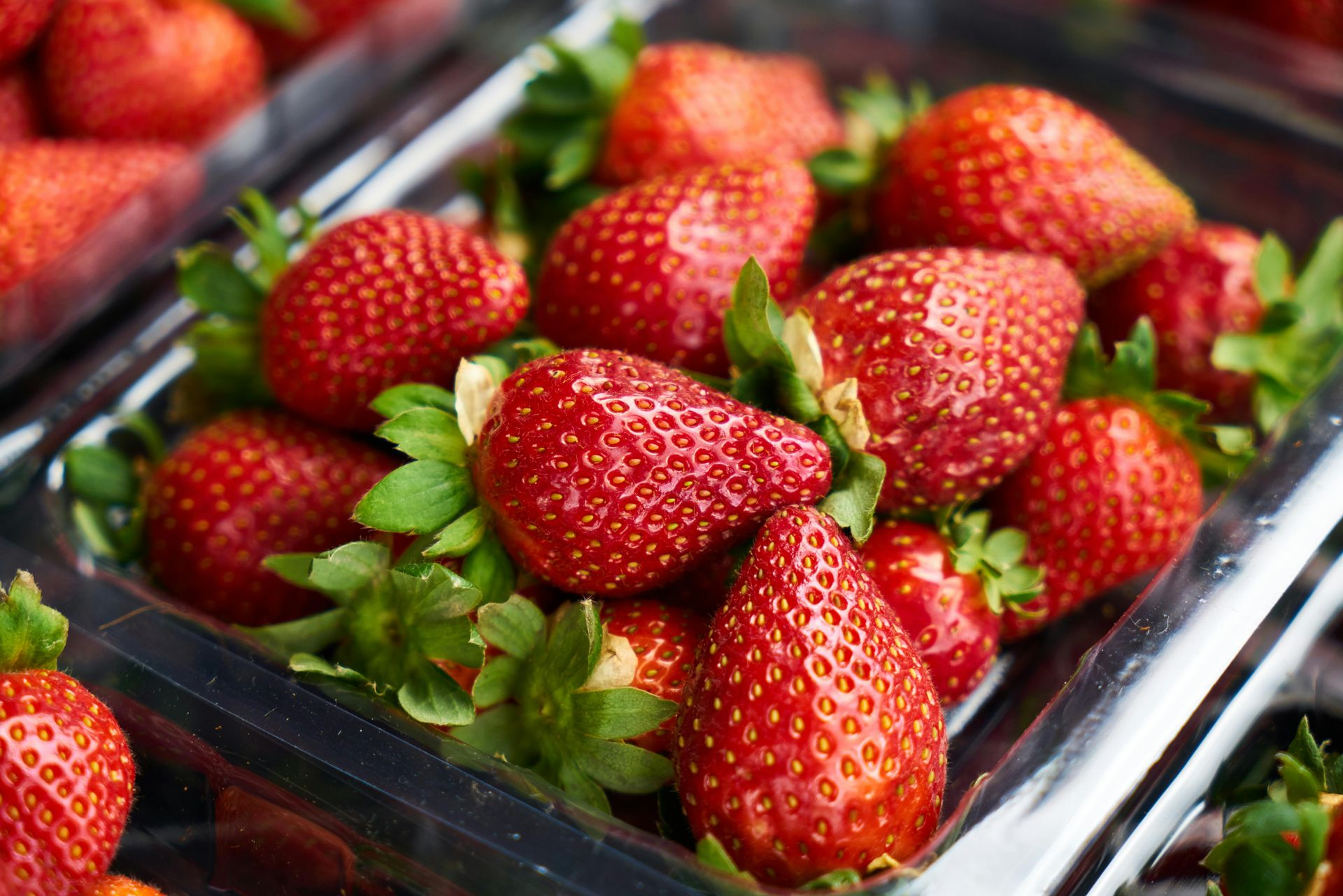
🍓 The Power of Strawberries 🍓
1. Introduction
Strawberries are not just delicious; they are a powerhouse of nutrients with numerous health benefits. Let’s explore why strawberries should be a staple in your diet.
2. Immunity Boost
Strawberries are packed with vitamin C, an essential nutrient for boosting your immune system. Vitamin C helps in the production of white blood cells, which are crucial for fighting off infections.
3. Vitamins and Minerals
- Vitamin C: Supports immune function and skin health.
- Manganese: Plays a role in bone formation and blood clotting.
- Folate: Essential for cell function and tissue growth.
- Potassium: Helps regulate blood pressure.
- Fiber: Promotes digestive health.
4. Diabetic Considerations
Strawberries are a great option for those with diabetes due to their low glycemic index, meaning they do not cause rapid spikes in blood sugar levels. However, fruits like bananas, grapes, and mangoes should be consumed in moderation by diabetics due to their higher sugar content.
5. Best Time to Eat Strawberries
Strawberries can be enjoyed at any time of the day. Eating them in the morning can kickstart your day with a refreshing dose of vitamins, while consuming them in the evening can satisfy your sweet tooth in a healthy way.
6. Delicious Strawberry Recipes
- Strawberry Smoothie:
- Ingredients: Strawberries, banana, Greek yogurt, honey, and almond milk.
- Instructions: Blend all ingredients until smooth and enjoy a refreshing drink.
- Strawberry Spinach Salad:
- Ingredients: Strawberries, baby spinach, walnuts, feta cheese, and balsamic vinaigrette.
- Instructions: Toss all ingredients together and drizzle with balsamic vinaigrette.
- Strawberry Chia Pudding:
- Ingredients: Strawberries, chia seeds, coconut milk, and maple syrup.
- Instructions: Mix chia seeds with coconut milk and maple syrup, let it sit overnight, and top with fresh strawberries.
- Strawberry Oatmeal:
- Ingredients: Strawberries, rolled oats, almond milk, and honey.
- Instructions: Cook oats in almond milk, stir in honey, and top with fresh strawberries.
7. Health Benefits of Strawberries
- Boosts Immunity: High in vitamin C.
- Supports Heart Health: Rich in antioxidants and fiber.
- Improves Skin Health: Vitamin C promotes collagen production.
- Aids Digestion: High fiber content supports gut health.
- Regulates Blood Pressure: Potassium helps balance sodium levels.
- Enhances Brain Function: Antioxidants combat oxidative stress.
- Supports Weight Loss: Low in calories and high in fiber.
- Promotes Bone Health: Contains manganese and potassium.
8. Strawberries for Digestion, Skincare, and Hair Grooming
- Digestion: The fiber in strawberries aids in regular bowel movements and supports gut health.
- Skincare: Vitamin C and antioxidants in strawberries help reduce signs of aging and promote glowing skin.
- Hair Grooming: The antioxidants and vitamin C in strawberries promote healthy hair growth and prevent hair loss.
Can diabetics eat strawberries?
Yes, diabetics can eat strawberries. In fact, strawberries are an excellent choice for people with diabetes due to their low glycemic index (GI). This means they have a minimal impact on blood sugar levels, helping to avoid rapid spikes.
Strawberries are also rich in fiber, which can further help regulate blood sugar levels by slowing down the absorption of sugars into the bloodstream. Additionally, they are packed with essential vitamins and antioxidants, such as vitamin C, which supports overall health and immunity.
As with any food, portion control is important, so it’s best to enjoy strawberries in moderation as part of a balanced diet.

🍊 Oranges: A Nutrient-Rich Powerhouse for Your Immune System 🍊
🍊 Introduction
Oranges are not only delicious and refreshing but also packed with essential nutrients that make them a perfect addition to your daily diet. Let's explore the scientific benefits of oranges, their role in boosting immunity, and why they are particularly beneficial for overall health.
🍊 Scientific Benefits & Nutritional Information
Oranges are an excellent source of vitamin C, which is vital for a strong immune system. They also contain a wide range of vitamins, minerals, and antioxidants that work together to improve health and prevent disease.
Vitamins and Minerals:
- Vitamin C: Boosts the immune system, aids in collagen production, and protects against free radical damage.
- Vitamin A: Supports vision and immune function.
- Vitamin B1 (Thiamine): Helps convert food into energy.
- Folate: Essential for cell division and DNA production.
- Potassium: Regulates blood pressure and fluid balance.
- Calcium: Strengthens bones and teeth.
🍊 Focus on Immunity Boost
Oranges are renowned for their high vitamin C content, which is crucial for enhancing immune function. Vitamin C stimulates the production of white blood cells, which are essential for defending the body against infections.
🍊 Oranges for Diabetics
Oranges have a low glycemic index (GI), making them a good choice for people with diabetes as they do not cause significant spikes in blood sugar levels. However, it's important to consume them in moderation. Diabetics should avoid fruits with high sugar content like grapes and mangoes.
🍊 Best Time to Eat Oranges
For optimal benefits, oranges can be consumed any time of the day. Eating them in the morning can provide a refreshing and nutritious start to your day, while enjoying them in the evening can satisfy your sweet tooth without the worry of consuming too many calories.
🍊 Delicious Orange Recipes
- Orange and Spinach Salad:
- Ingredients: Fresh orange slices, baby spinach, walnuts, feta cheese, and a light vinaigrette dressing.
- Instructions: Toss all ingredients together and drizzle with dressing for a refreshing and nutrient-packed salad.
- Orange Smoothie:
- Ingredients: Oranges, Greek yogurt, banana, honey, and ice.
- Instructions: Blend all ingredients until smooth, and serve chilled for a creamy and tangy treat.
- Orange-Glazed Chicken:
- Ingredients: Chicken breasts, orange juice, garlic, soy sauce, and honey.
- Instructions: Marinate chicken in a mixture of orange juice, garlic, soy sauce, and honey, then bake or grill until cooked through.
- Orange Sorbet:
- Ingredients: Fresh orange juice, sugar, water, and lemon juice.
- Instructions: Combine all ingredients, freeze in an ice cream maker, and enjoy a refreshing dessert.
🍊 8 Health Benefits of Oranges
- Boosts Immunity: High vitamin C content strengthens the immune system.
- Improves Heart Health: Potassium and antioxidants support cardiovascular health.
- Aids in Digestion: Dietary fiber promotes healthy digestion and prevents constipation.
- Supports Skin Health: Vitamin C aids in collagen production, improving skin texture and reducing wrinkles.
- Enhances Vision: Vitamin A supports eye health and prevents night blindness.
- Regulates Blood Pressure: Potassium helps manage blood pressure levels.
- Reduces Cancer Risk: Antioxidants combat oxidative stress, reducing the risk of certain cancers.
- Promotes Weight Loss: Low in calories and high in fiber, oranges keep you full longer, aiding in weight management.
🍊 Oranges for Digestion, Skincare, and Hair Grooming
- Digestion: Oranges are rich in dietary fiber, which promotes regular bowel movements and supports gut health.
- Skincare: The high vitamin C content in oranges boosts collagen production, leading to healthier, glowing skin.
- Hair Grooming: Vitamin C also helps in the production of collagen, which is vital for strong and healthy hair.
✨ Stay Connected for a Healthier Life!
For more information on maintaining a healthy lifestyle, connect with us! Get access to free eBooks, meal plans, diet charts, workout routines, and much more.
Stay healthy, stay vibrant! 🍊✨
Orange juice vs whole?
When it comes to choosing between orange juice and whole oranges, each has its own set of benefits and considerations. Here's a comparison to help you decide which might be better for you:
🍊 Nutrient Content
- Whole Oranges:
- Contain all the fiber, which aids in digestion, promotes fullness, and helps regulate blood sugar levels.
- Provide a full range of nutrients, including vitamins C, A, B1, and folate, along with antioxidants and minerals like potassium.
- The fiber in whole oranges slows down the absorption of sugar, preventing rapid spikes in blood sugar.
- Orange Juice:
- Is often more concentrated in vitamins and minerals, especially vitamin C.
- Lacks the fiber found in whole oranges, which can lead to quicker sugar absorption and potential spikes in blood sugar.
- Can be more convenient and easier to consume in larger quantities, which might lead to higher calorie intake.
🍊 Sugar and Calorie Content
- Whole Oranges:
- Have less sugar and fewer calories per serving compared to orange juice. The natural fiber in whole oranges helps balance sugar intake.
- Orange Juice:
- Contains more sugar and calories, especially if it's a large portion or commercially processed juice with added sugars.
- Even without added sugars, orange juice can still contribute to a higher glycemic load due to the lack of fiber.
🍊 Satiety and Portion Control
- Whole Oranges:
- Are more filling due to their fiber content, helping with portion control and reducing the likelihood of overeating.
- Orange Juice:
- Can be consumed quickly, which might lead to drinking more than intended and consuming excess calories and sugar.
🍊 Impact on Blood Sugar (Diabetes Consideration)
- Whole Oranges:
- Better for blood sugar management due to the fiber content, which slows down sugar absorption.
- Orange Juice:
- Can cause rapid spikes in blood sugar, which is not ideal for individuals with diabetes or those at risk of developing it.
🍊 Immune Boosting Properties
- Both:
- Offer high levels of vitamin C, which supports immune function. However, the whole orange also offers additional benefits from fiber and other nutrients.
🍊 Conclusion: Which Is Better?
- For General Health: Whole oranges are generally better due to their lower sugar content, higher fiber, and better satiety. They are a more balanced option that provides a fuller range of nutrients.
- For Quick Vitamin C Boost: Orange juice can be beneficial if you need a quick and convenient vitamin C boost, but it's best to choose fresh, 100% orange juice without added sugars.
🍊 Best Time to Consume:
- Whole Oranges: Can be eaten at any time of the day, but they are especially beneficial in the morning or as a midday snack to keep energy levels stable.
- Orange Juice: Best consumed in moderation, ideally in the morning with breakfast. Pairing it with a meal that includes protein and fiber can help mitigate blood sugar spikes.
In summary, whole oranges are generally the healthier choice, especially for those mindful of sugar intake and blood sugar levels. Orange juice can still be part of a healthy diet but should be consumed in moderation

🌟 Peaches: A Delicious Way to Boost Your Immunity 🌟
🍑 Introduction Peaches are more than just a sweet summer treat; they are a powerhouse of nutrients that can significantly boost your immune system. Let’s explore the science behind peaches, their nutritional content, and how they can contribute to a healthier lifestyle.
🍑 Scientific Benefits and Nutritional Information Peaches are rich in vitamins, minerals, and antioxidants that play a vital role in enhancing your overall health. They are particularly known for their high content of vitamins A and C, which are crucial for a robust immune system.
Vitamins and Minerals:
- Vitamin A: Supports vision, immune function, and skin health.
- Vitamin C: Boosts immune function, helps repair body tissues, and promotes healthy skin.
- Vitamin E: Protects cells from oxidative damage.
- Potassium: Helps regulate blood pressure and fluid balance.
- Fiber: Promotes healthy digestion and maintains bowel regularity.
🍑 Focus on Immunity Boost Peaches are excellent for boosting immunity due to their high vitamin C content. Vitamin C is essential for the production of white blood cells, which are vital for fighting off infections. The antioxidants in peaches also help reduce inflammation and protect the body from harmful free radicals.
🍑 Peaches and Diabetes Peaches have a low glycemic index (GI), making them a better choice for people with diabetes. They provide natural sweetness without causing significant spikes in blood sugar levels. However, it’s important to consume them in moderation and pair them with other low-GI foods.
Fruits to Avoid with High Blood Sugar:
- Grapes
- Pineapple
- Watermelon
🍑 Best Time to Eat Peaches For optimal benefits, peaches can be consumed at any time of the day. Eating them in the morning provides a refreshing start, packed with energy and nutrients. Consuming them in the evening can satisfy sweet cravings healthily and aid digestion due to their fiber content.
🍑 Delicious Peach Recipes
- Peach Smoothie:
- Ingredients: Fresh peaches, Greek yogurt, honey, almond milk.
- Instructions: Blend all ingredients until smooth. Serve chilled.
- Grilled Peaches:
- Ingredients: Fresh peaches, honey, cinnamon.
- Instructions: Slice peaches, drizzle with honey, sprinkle cinnamon, and grill until caramelized.
- Peach Salsa:
- Ingredients: Diced peaches, red onion, cilantro, lime juice, jalapeño.
- Instructions: Mix all ingredients, season with salt, and serve with tortilla chips.
- Peach and Quinoa Salad:
- Ingredients: Cooked quinoa, sliced peaches, spinach, feta cheese, balsamic vinegar.
- Instructions: Toss all ingredients together and drizzle with balsamic vinegar.
🍑 Health Benefits of Peaches
- Boosts Immunity: High in vitamin C, promoting a strong immune system.
- Promotes Healthy Skin: Vitamin A and C improve skin texture and elasticity.
- Supports Digestion: Rich in fiber, aiding digestion and preventing constipation.
- Regulates Blood Pressure: Potassium content helps maintain healthy blood pressure levels.
- Aids Weight Management: Low in calories and high in water content, keeping you full longer.
- Improves Vision: Vitamin A supports good eyesight and reduces the risk of macular degeneration.
- Fights Inflammation: Antioxidants reduce inflammation and protect against chronic diseases.
- Enhances Heart Health: Fiber and potassium work together to support cardiovascular health.
🍑 Peaches for Digestion, Skincare, and Hair Grooming
- Digestion: The fiber in peaches helps regulate bowel movements, preventing constipation, and promoting gut health.
- Skincare: Vitamin C and A in peaches promote collagen production, reducing signs of aging and keeping skin youthful.
- Hair Grooming: The vitamins and minerals in peaches nourish the scalp and strengthen hair, promoting growth and preventing hair loss.

🌟 Pineapple: Your Immunity-Boosting Powerhouse! 🌟
🍍 Scientific Insights on Pineapple
Pineapple (Ananas comosus) is more than just a tropical delight—it's a nutritional powerhouse packed with essential vitamins, minerals, and enzymes that support your overall health. Known for its vibrant taste and numerous health benefits, pineapple is particularly renowned for its role in boosting immunity, aiding digestion, and promoting glowing skin and healthy hair.
🛡️ Focus on Immunity
Pineapple is rich in vitamin C, which is crucial for a robust immune system. A single cup of pineapple provides more than 100% of the recommended daily intake of vitamin C. This vitamin is essential for the production of white blood cells, which help protect the body against infections and illnesses.
🥭 Diabetics: Pineapple vs. Other Fruits
For individuals with diabetes, managing blood sugar levels is critical. Pineapple has a moderate glycemic index (GI) of around 59, meaning it can raise blood sugar levels but not as rapidly as high-GI foods. However, it's important to consume pineapple in moderation.
Better Choice for Diabetics:
- Berries (like strawberries and blueberries) have a lower GI and are better for those with high blood sugar.
Fruits to Avoid:
- Watermelon and ripe bananas, which have a higher GI, should be consumed in smaller amounts or avoided if you have high blood sugar levels.
🕒 Best Time to Eat Pineapple
For optimal benefits, consume pineapple in the morning or as a mid-day snack. Its enzymes can aid digestion and its high vitamin C content can give you an energy boost to start your day.
🍽️ 4 Delicious Pineapple Recipes
- Pineapple Smoothie Bowl
Blend fresh pineapple, Greek yogurt, and a handful of spinach. Top with chia seeds and granola for a refreshing breakfast. - Grilled Pineapple Salad
Grill pineapple slices and toss with mixed greens, avocado, and a light vinaigrette. Perfect for a light lunch. - Pineapple Salsa
Combine diced pineapple, red onion, jalapeños, and cilantro. Serve with whole-grain tortilla chips or as a topping for grilled chicken. - Pineapple Chia Pudding
Mix pineapple puree with chia seeds and almond milk. Refrigerate overnight for a healthy dessert or breakfast option.
🌟 8 Health Benefits of Pineapple
- Boosts Immunity: High in vitamin C, pineapple strengthens the immune system.
- Aids Digestion: Contains bromelain, an enzyme that helps break down protein and reduces bloating.
- Anti-inflammatory: Bromelain also has anti-inflammatory properties that can help reduce pain and swelling.
- Promotes Healthy Skin: Vitamin C helps in collagen production, leading to firmer, more youthful skin.
- Supports Weight Loss: Low in calories and high in fiber, pineapple aids in weight management.
- Strengthens Bones: Contains manganese, essential for bone health and metabolism.
- Improves Eye Health: Rich in antioxidants, pineapple helps protect the eyes from macular degeneration.
- Enhances Hair Health: Vitamin C and bromelain promote hair growth and reduce hair loss.
🌱 Pineapple for Digestion, Skincare, and Hair Grooming
- Digestion: Bromelain helps in the breakdown of proteins, making digestion smoother and reducing bloating and constipation.
- Skincare: Vitamin C aids in collagen production, reducing wrinkles and giving the skin a youthful appearance. The antioxidants in pineapple also fight against skin damage.
- Hair Grooming: The nutrients in pineapple, particularly vitamin C, promote hair growth and reduce hair thinning, ensuring stronger, shinier hair.

🌟 Mango: The King of Fruits for Immunity and Health! 🌟
🍋 Scientific Insights on Mango
Mango (Mangifera indica), often referred to as the "King of Fruits," is not just a delicious summer treat but also a nutrient-dense fruit that offers numerous health benefits. Rich in vitamins, minerals, and antioxidants, mangoes are particularly beneficial for boosting immunity, supporting digestion, and enhancing skin and hair health.
🛡️ Focus on Immunity
Mangoes are packed with vitamin C and vitamin A, both of which are essential for a strong immune system. One cup of sliced mango provides about 60% of your daily vitamin C needs. This vitamin plays a crucial role in the production of white blood cells, which are the body's primary defense against infections.
🥭 Mango for Diabetics: Friend or Foe?
Mangoes have a moderate glycemic index (GI) of around 51-60, which means they can raise blood sugar levels but not as sharply as high-GI foods. For diabetics, moderation is key.
Better Choice for Diabetics:
- Berries: Blueberries, strawberries, and raspberries have a lower GI and are safer for those with high blood sugar.
Fruits to Avoid:
- Ripe Bananas and Watermelon: Both have a higher GI and should be consumed in smaller quantities if you have high sugar levels.
🕒 Best Time to Eat Mango
For the best results, enjoy mangoes in the morning or as an afternoon snack. Consuming mangoes earlier in the day helps your body utilize the natural sugars more effectively and provides a burst of energy to fuel your activities.
🍽️ 4 Delicious Mango Recipes
- Mango Smoothie
Blend fresh mango, Greek yogurt, a dash of honey, and a sprinkle of chia seeds for a refreshing and nutritious breakfast smoothie. - Mango Salsa
Dice mangoes, red bell peppers, red onions, and cilantro. Mix with lime juice for a zesty salsa perfect for grilled chicken or fish. - Mango Chia Pudding
Combine mango puree with chia seeds and coconut milk. Let it sit overnight for a healthy and tasty dessert or breakfast. - Mango Salad
Mix mango cubes with avocado, cherry tomatoes, and arugula. Drizzle with olive oil and balsamic vinegar for a light, flavorful salad.
🌟 8 Health Benefits of Mango
- Boosts Immunity: High in vitamin C and A, mangoes strengthen the immune system.
- Aids Digestion: Rich in dietary fiber and enzymes like amylase, mangoes help in breaking down food and improving digestion.
- Promotes Eye Health: Mangoes contain lutein and zeaxanthin, which protect the eyes from harmful UV rays and reduce the risk of cataracts.
- Supports Heart Health: The potassium and magnesium in mangoes help maintain healthy blood pressure levels.
- Improves Skin Health: Vitamin A and C promote collagen production, reducing signs of aging and giving the skin a healthy glow.
- Enhances Hair Health: Mangoes are rich in vitamin E, which helps in improving blood circulation to the scalp, promoting hair growth.
- Supports Weight Management: Low in calories and high in fiber, mangoes can aid in weight control.
- Anti-inflammatory Properties: The polyphenols in mangoes help reduce inflammation in the body.
🌱 Mango for Digestion, Skincare, and Hair Grooming
- Digestion: Mangoes contain dietary fiber and digestive enzymes like amylase, which help in the breakdown of complex carbohydrates and proteins, easing digestion and preventing constipation.
- Skincare: The high vitamin A and C content in mangoes promotes collagen production, reduces wrinkles, and gives the skin a vibrant glow.
- Hair Grooming: Vitamin E and antioxidants in mangoes improve blood circulation to the scalp, strengthen hair follicles, and reduce hair thinning.

🍉 Watermelon: The Ultimate Hydration and Immunity Booster! 🌟
🍃 Scientific Insights on Watermelon
Watermelon (Citrullus lanatus) is a refreshing and hydrating fruit, perfect for hot summer days. Comprising over 90% water, it’s an excellent way to stay hydrated while also reaping numerous health benefits. Watermelon is rich in vitamins, minerals, and antioxidants, making it a fantastic choice for boosting immunity, improving digestion, and enhancing skin and hair health.
🛡️ Focus on Immunity
Watermelon is packed with vitamin C, which is essential for a strong immune system. A serving of watermelon provides about 21% of your daily vitamin C needs. This vitamin plays a crucial role in protecting the body against infections and boosting overall immune function. Additionally, watermelon contains lycopene, a powerful antioxidant that helps reduce oxidative stress and inflammation, further supporting the immune system.
🍉 Watermelon and Diabetes: A Delicate Balance
Watermelon has a high glycemic index (GI) of around 72, meaning it can raise blood sugar levels quickly. While it’s hydrating and nutritious, people with diabetes should consume watermelon in moderation and be mindful of portion sizes.
Better Choice for Diabetics:
- Berries: Blueberries, raspberries, and strawberries have a lower GI and are safer for those managing blood sugar levels.
Fruits to Avoid:
- Overripe Bananas and Pineapple: Both have higher sugar content and GI, which can cause blood sugar spikes.
🕒 Best Time to Eat Watermelon
For optimal benefits, enjoy watermelon in the morning or as an early afternoon snack. Its high water content makes it a great way to start your day hydrated, and the natural sugars provide a quick energy boost.
🍽️ 4 Delicious Watermelon Recipes
- Watermelon Feta Salad
Combine fresh watermelon cubes with crumbled feta cheese, mint leaves, and a drizzle of balsamic glaze for a refreshing summer salad. - Watermelon Smoothie
Blend watermelon chunks with a splash of lime juice and mint leaves for a hydrating and revitalizing smoothie. - Watermelon Sorbet
Freeze watermelon cubes and blend them with a touch of honey and lemon juice for a healthy and refreshing sorbet. - Watermelon Gazpacho
Mix diced watermelon, cucumber, tomato, and bell pepper with a splash of olive oil and vinegar for a chilled, savory gazpacho.
🌟 8 Health Benefits of Watermelon
- Boosts Immunity: High in vitamin C, watermelon strengthens the immune system and fights off infections.
- Hydrates the Body: With over 90% water content, watermelon helps keep you hydrated and supports overall bodily functions.
- Aids Digestion: Watermelon contains fiber, which aids in digestion and prevents constipation.
- Supports Heart Health: Lycopene in watermelon reduces cholesterol levels and supports heart health.
- Promotes Eye Health: The vitamin A in watermelon helps maintain good vision and reduces the risk of age-related macular degeneration.
- Enhances Skin Health: The antioxidants in watermelon, including vitamin C, help combat skin damage and promote collagen production.
- Supports Weight Management: Low in calories and high in water, watermelon helps you feel full and supports weight loss efforts.
- Reduces Muscle Soreness: The amino acid citrulline in watermelon may help reduce muscle soreness and improve exercise performance.
🌱 Watermelon for Digestion, Skincare, and Hair Grooming
- Digestion: Watermelon is high in water and contains a small amount of fiber, both of which help support healthy digestion and prevent constipation.
- Skincare: The vitamin C and antioxidants in watermelon help protect the skin from oxidative damage, promote collagen production, and keep the skin hydrated and glowing.
- Hair Grooming: Watermelon’s vitamin C content supports healthy hair growth by boosting collagen production, which strengthens hair and prevents breakage
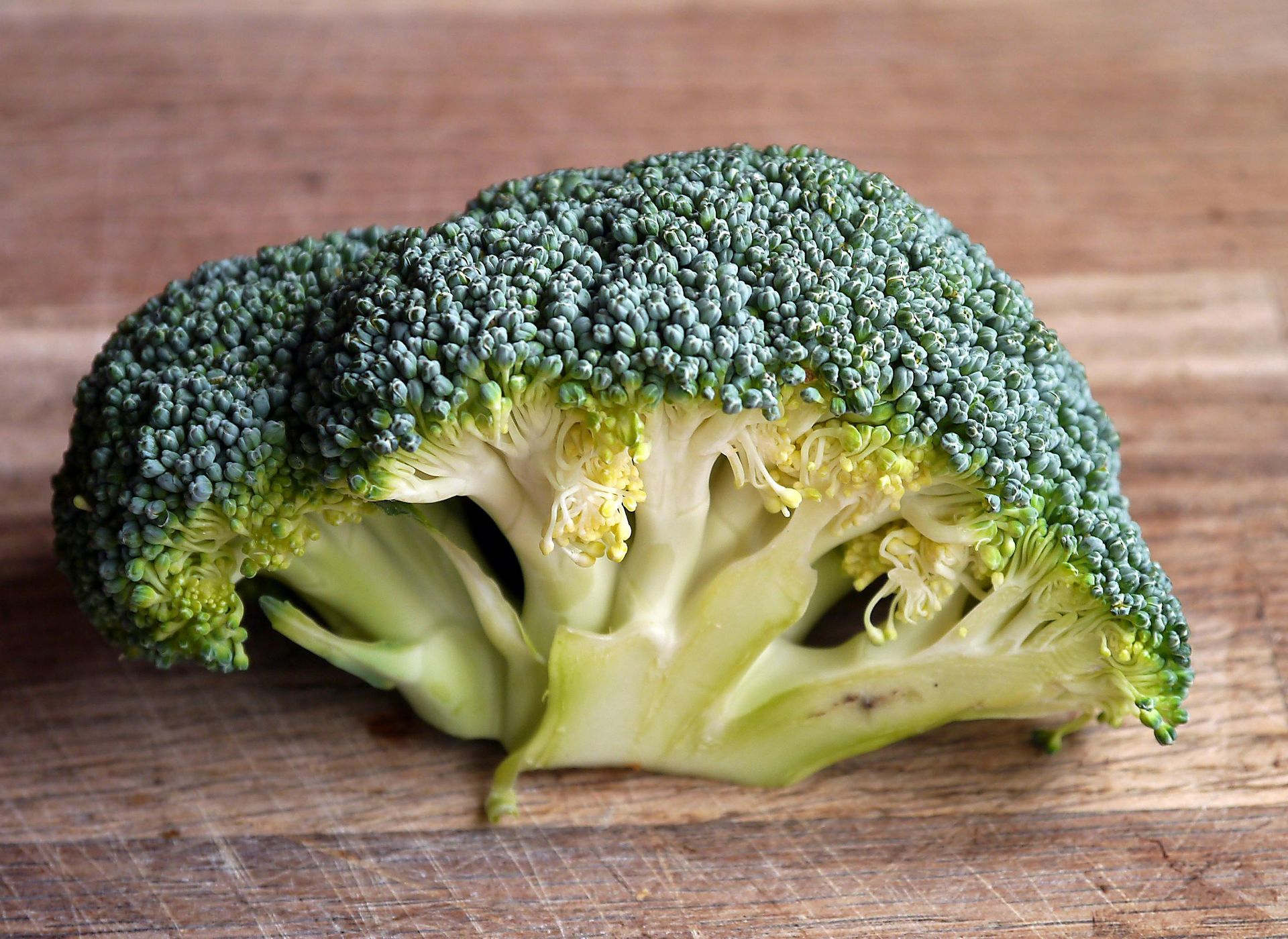
🌿 Broccoli: The Nutrient-Packed Powerhouse for Your Health 🌿
1. Scientific Overview: Broccoli is a member of the cruciferous vegetable family, which also includes kale, Brussels sprouts, and cauliflower. It is rich in vitamins, minerals, fiber, and antioxidants. One of the key compounds in broccoli is sulforaphane, a potent antioxidant known for its health-protective properties.
2. Focus on Immunity Boost: Broccoli is an excellent source of vitamin C, which is essential for the proper functioning of the immune system. Vitamin C helps in the production of white blood cells, which are crucial for fighting off infections. Additionally, the antioxidant properties of sulforaphane in broccoli help reduce oxidative stress, further supporting immune health.
3. Vitamins and Minerals Detail:
- Vitamin C: Boosts immunity and skin health.
- Vitamin K: Supports bone health and aids in blood clotting.
- Folate: Essential for DNA synthesis and repair.
- Iron: Supports the production of hemoglobin and energy metabolism.
- Potassium: Regulates fluid balance, nerve signals, and muscle contractions.
- Fiber: Promotes digestive health and helps maintain stable blood sugar levels.
4. Broccoli for Diabetics: Broccoli is low in carbohydrates and high in fiber, making it an excellent choice for people with diabetes. The fiber helps slow down the absorption of sugar, preventing spikes in blood sugar levels. For those managing diabetes, it's essential to avoid fruits with high sugar content, such as grapes and mangoes, which can cause blood sugar levels to rise.
5. Best Time to Eat Broccoli: For optimal results, it's best to consume broccoli during the morning or midday. This allows your body to fully utilize its nutrients throughout the day. Eating it earlier also helps prevent indigestion that could occur if consumed too late in the evening.
6. 4 Delicious Broccoli Recipes:
- Broccoli and Quinoa Salad: A refreshing salad with broccoli, cooked quinoa, cherry tomatoes, and a lemon-tahini dressing.
- Garlic Roasted Broccoli: Oven-roasted broccoli florets tossed in olive oil, garlic, and Parmesan cheese.
- Broccoli and Cheddar Soup: A creamy soup made with fresh broccoli, cheddar cheese, and vegetable broth.
- Stir-Fried Broccoli with Tofu: A quick stir-fry with broccoli, tofu, soy sauce, and sesame seeds.
7. 8 Health Benefits of Broccoli:
- 1. Boosts Immune System: High vitamin C content strengthens immune response.
- 2. Supports Digestive Health: Rich in fiber, aiding digestion and preventing constipation.
- 3. Promotes Heart Health: Antioxidants in broccoli help reduce cholesterol levels.
- 4. Supports Bone Health: High vitamin K content supports strong bones.
- 5. Enhances Eye Health: Contains lutein and zeaxanthin, which protect against eye disorders.
- 6. Regulates Blood Sugar Levels: Low glycemic index and high fiber help stabilize blood sugar.
- 7. Promotes Healthy Skin: Vitamin C and antioxidants help maintain youthful, glowing skin.
- 8. Aids in Weight Management: Low in calories and high in fiber, keeping you full for longer.
8. Broccoli for Digestion, Skincare, and Hair Grooming:
- Digestion: Broccoli's high fiber content aids in regular bowel movements and maintains a healthy gut microbiome. It also contains compounds like sulforaphane that protect the stomach lining and reduce the risk of gastrointestinal disorders.
- Skincare: Broccoli is packed with vitamin C, which is crucial for collagen production, helping to keep your skin firm and elastic. The antioxidants in broccoli help fight free radicals, reducing signs of aging and promoting a healthy, radiant complexion.
- Hair Grooming: The vitamin A in broccoli helps produce sebum, which keeps hair moisturized and healthy. Vitamin C also plays a role in collagen formation, essential for strong and healthy hair growth.
Why Broccoli is Good for Diabetes:
- Low Glycemic Index (GI): Broccoli has a low glycemic index, which means it doesn't cause a rapid spike in blood sugar levels after consumption. Foods with a low GI are ideal for managing diabetes.
- High Fiber Content: Broccoli is rich in dietary fiber, which helps slow the absorption of sugar into the bloodstream. This helps in maintaining stable blood sugar levels and preventing sudden spikes.
- Rich in Antioxidants: Broccoli contains a powerful antioxidant called sulforaphane. Research suggests that sulforaphane can help improve blood sugar control and reduce oxidative stress, which is particularly beneficial for people with diabetes.
- Anti-Inflammatory Properties: Chronic inflammation is a common concern for people with diabetes. Broccoli's anti-inflammatory properties help reduce inflammation in the body, potentially lowering the risk of complications related to diabetes.
- Supports Heart Health: People with diabetes are at a higher risk of heart disease. Broccoli helps improve cholesterol levels and supports heart health, making it a valuable addition to a diabetic diet.
When to Eat Broccoli for Best Results:
Eating broccoli during lunch or dinner can be particularly beneficial, as it provides sustained energy and helps keep blood sugar levels steady throughout the day.
Which Fruits to Avoid for Diabetics:
While broccoli is an excellent choice, some fruits should be consumed in moderation or avoided by those managing diabetes, such as:
- Grapes: High in natural sugars, which can cause blood sugar levels to rise.
- Mangoes: Also high in sugars and can lead to spikes in blood sugar.
- Pineapple: Has a higher glycemic index and can raise blood sugar quickly.
Including broccoli in a balanced diet can help manage diabetes effectively, contributing to overall health and well-being.
